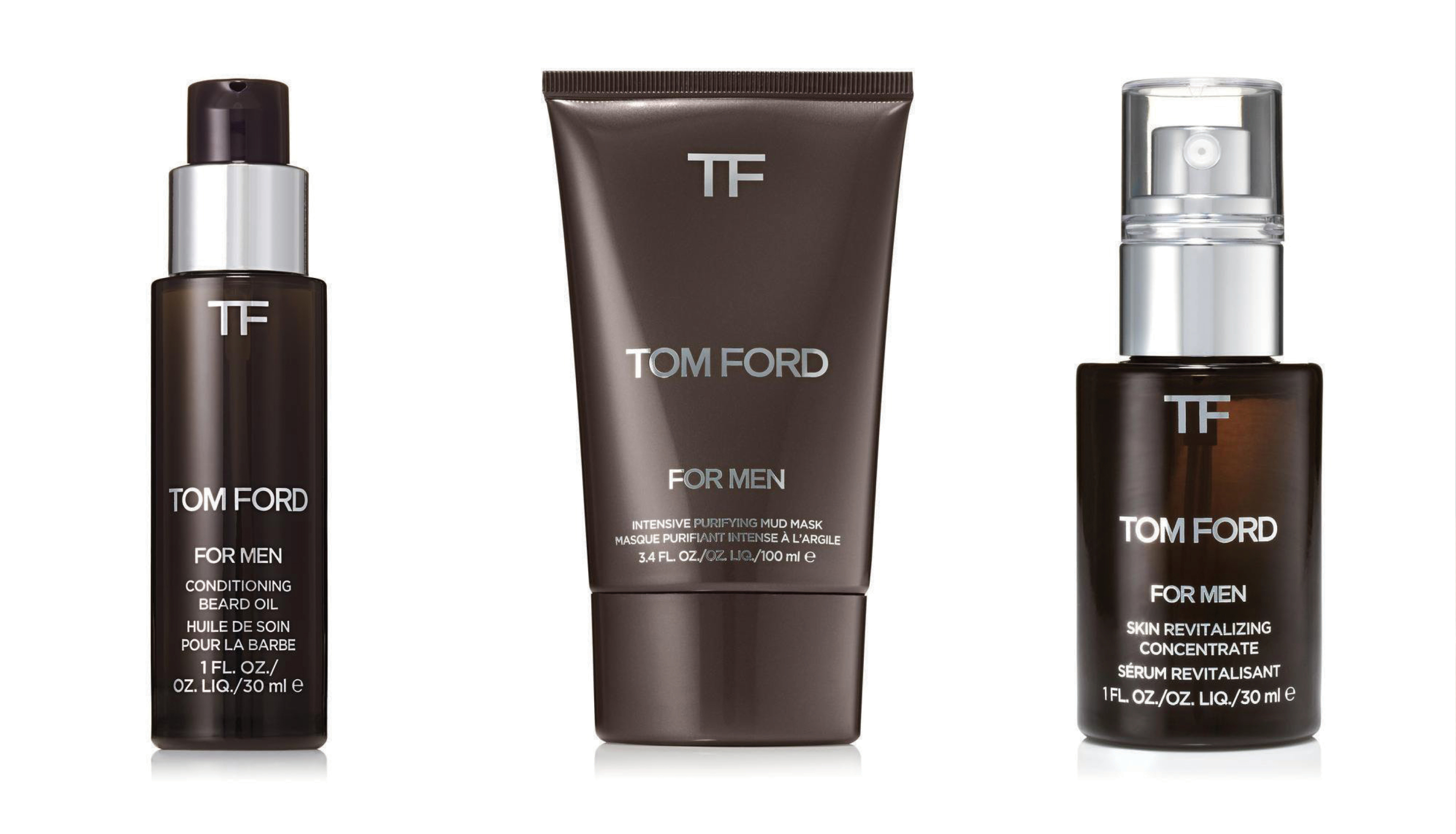SCREEN TEST: TREVOR SIGNORINO
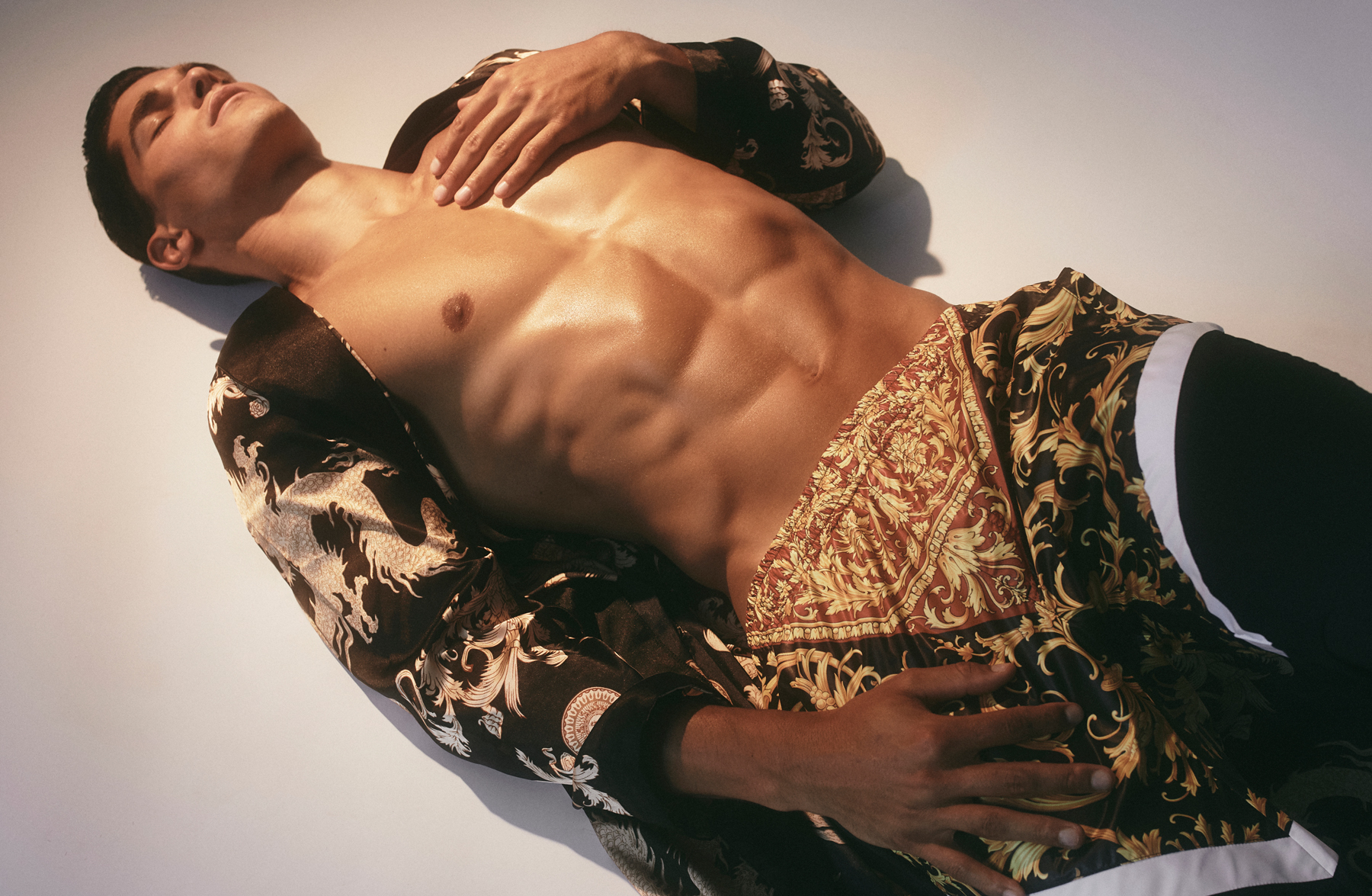
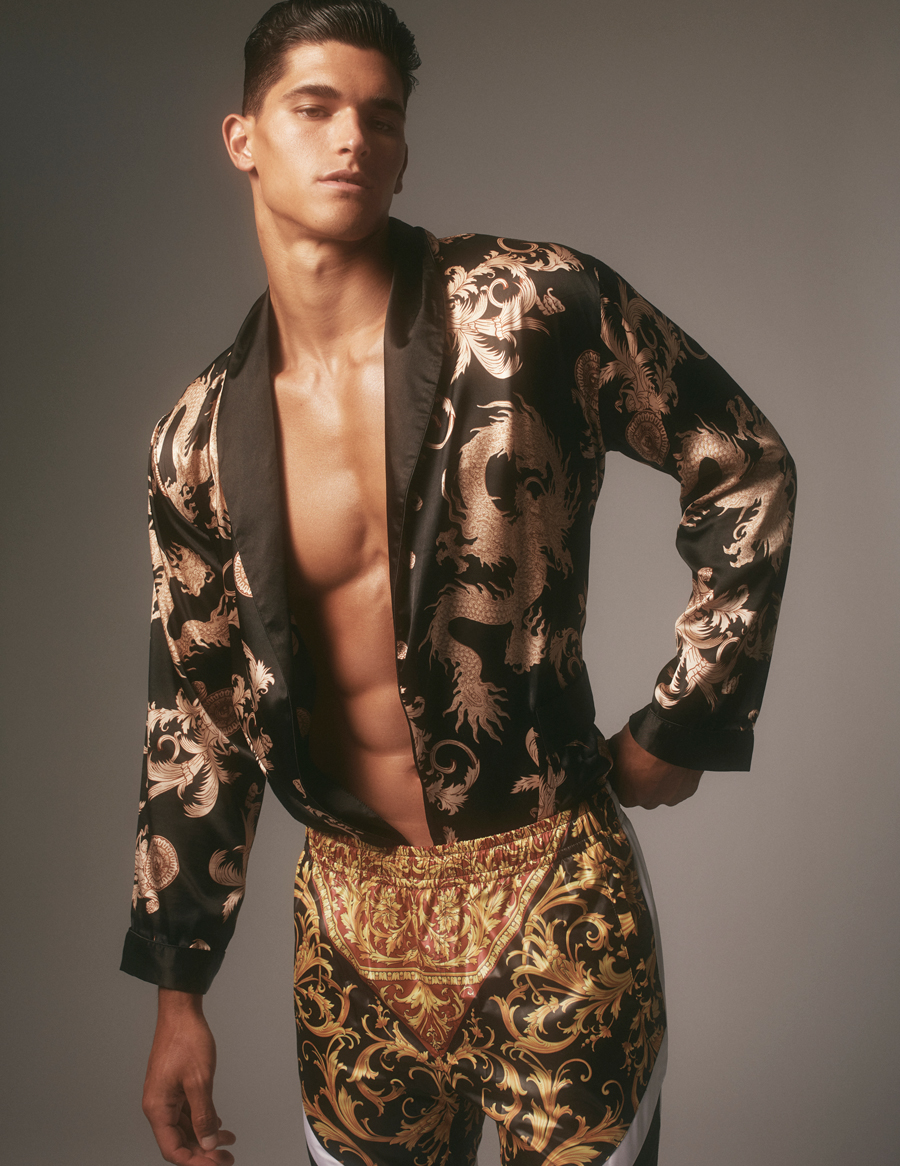
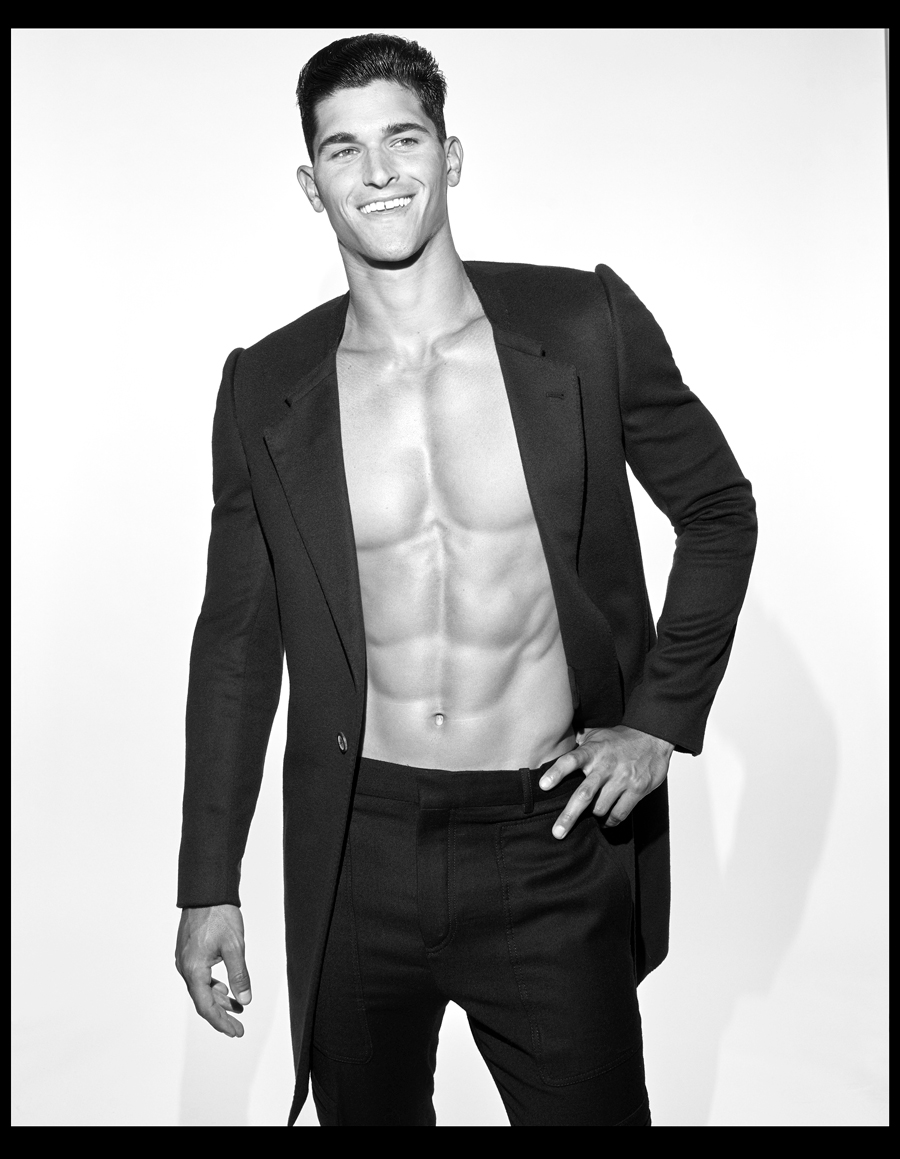
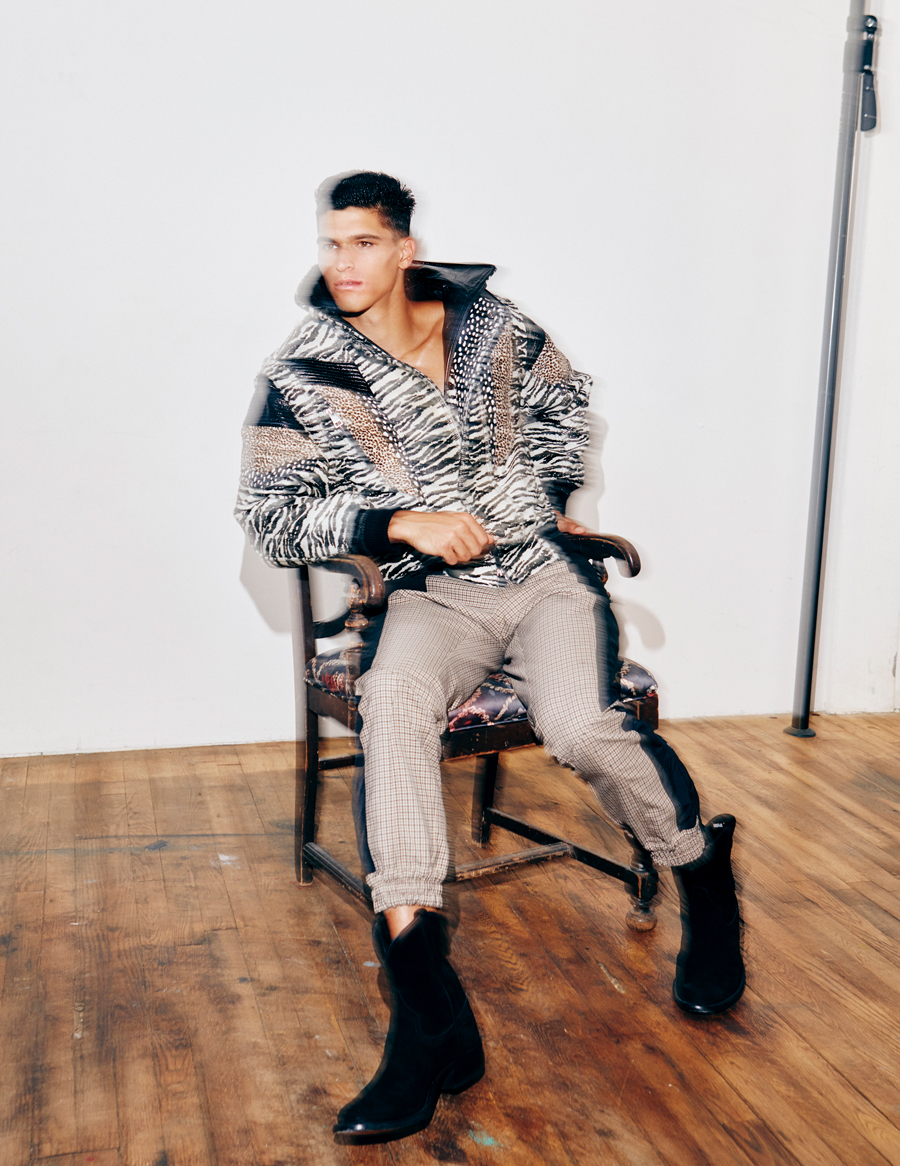
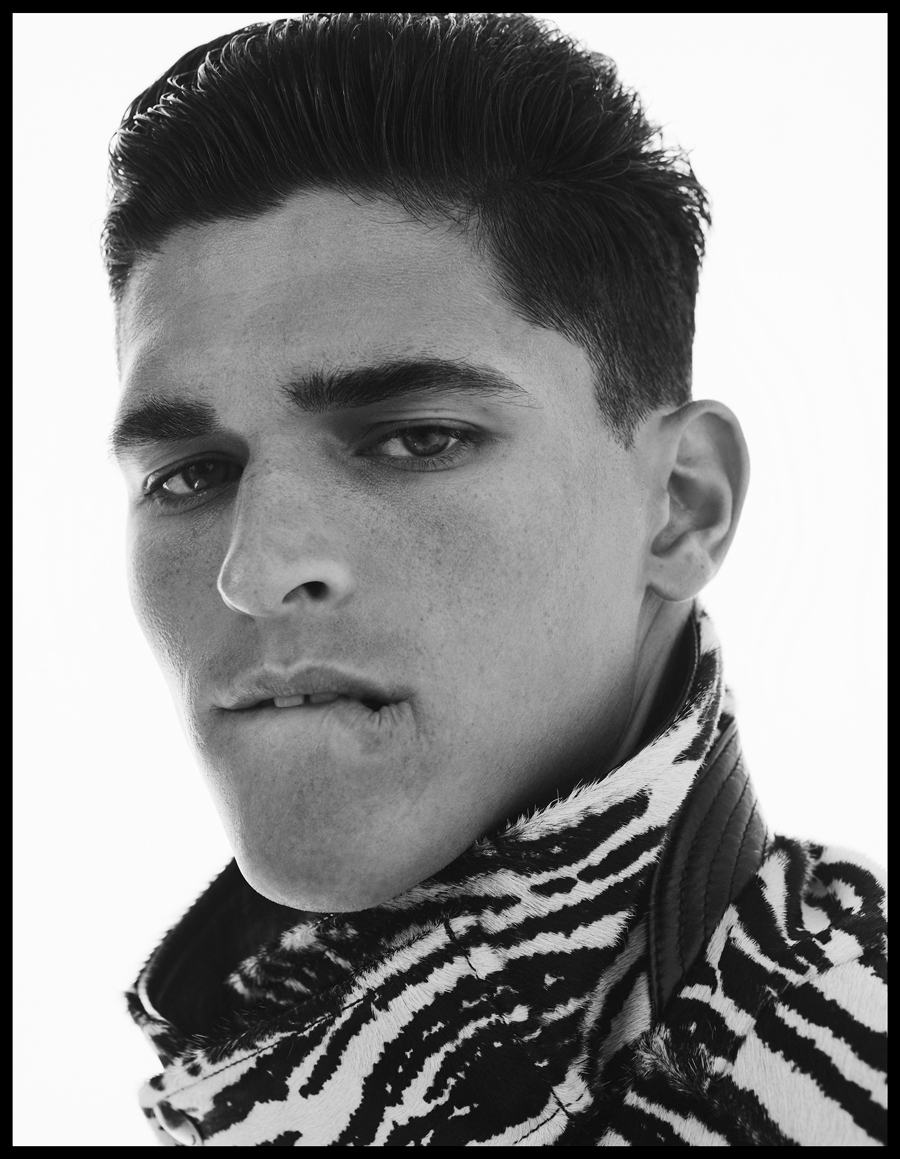
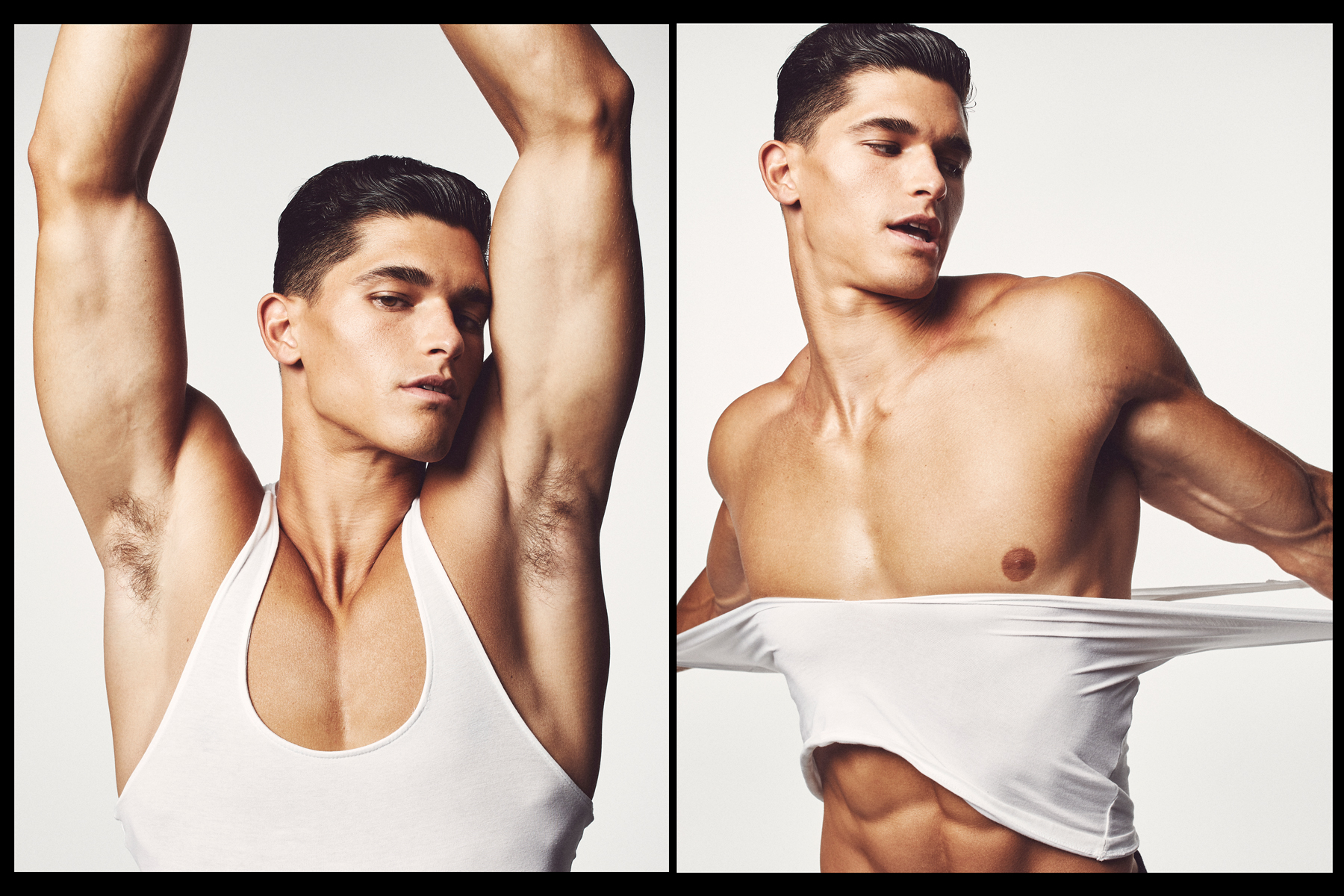
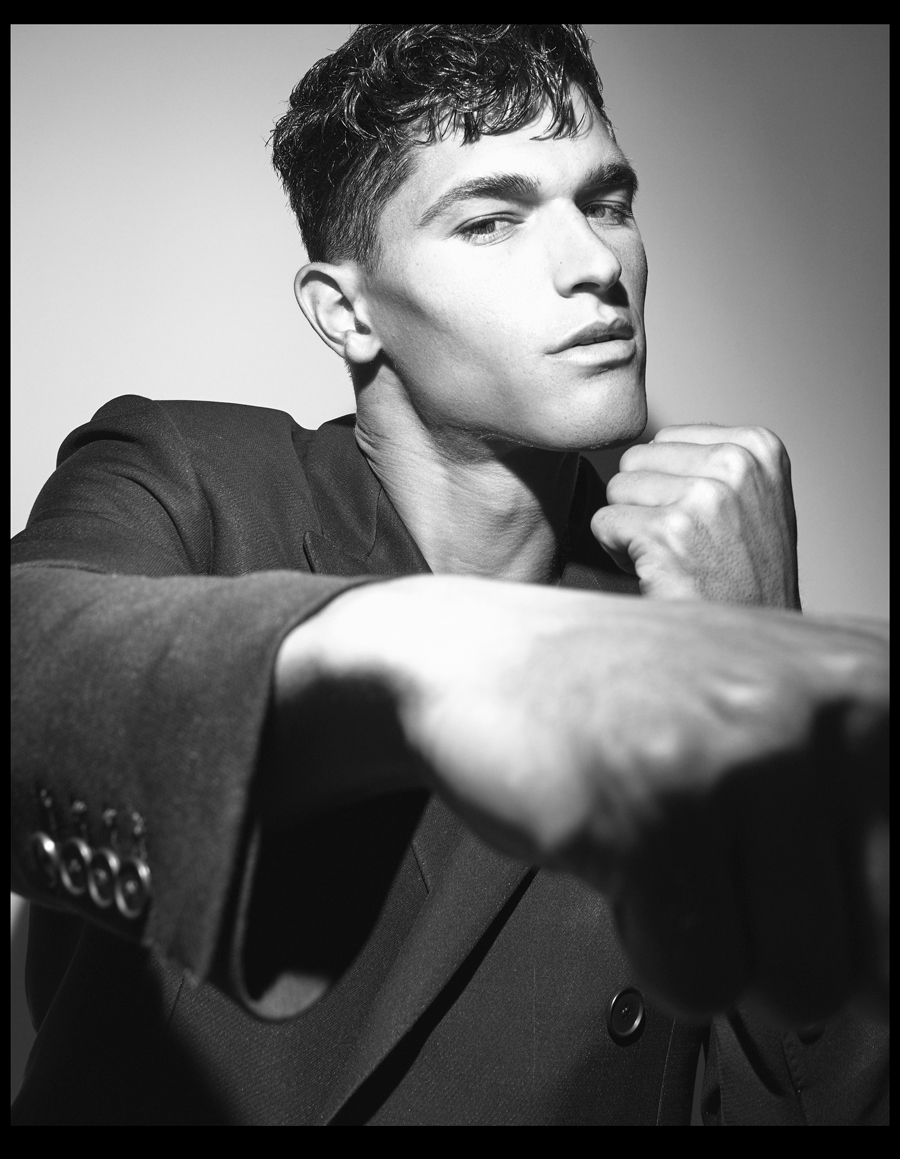
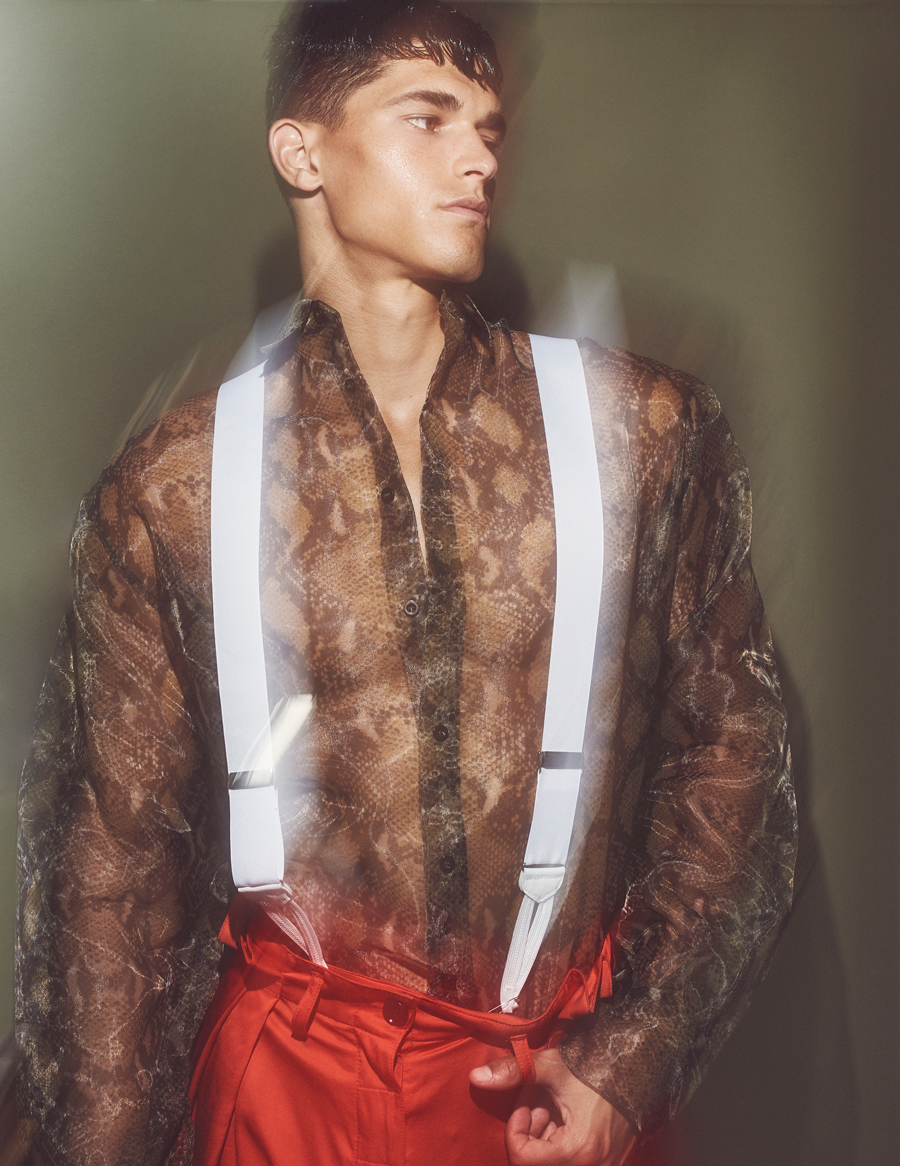
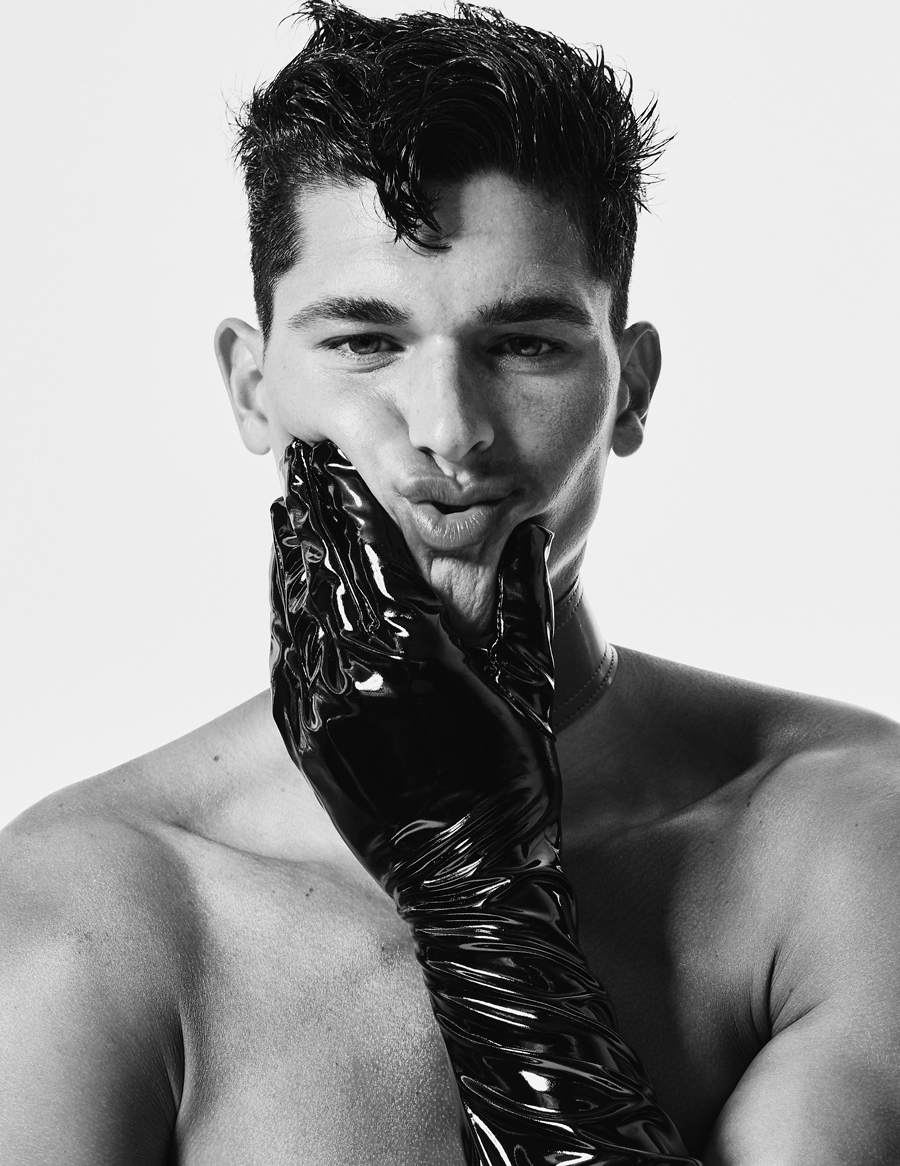

A diverse glimpse into the worlds and personalities of fashion, beauty, culture, philanthropy, and art.









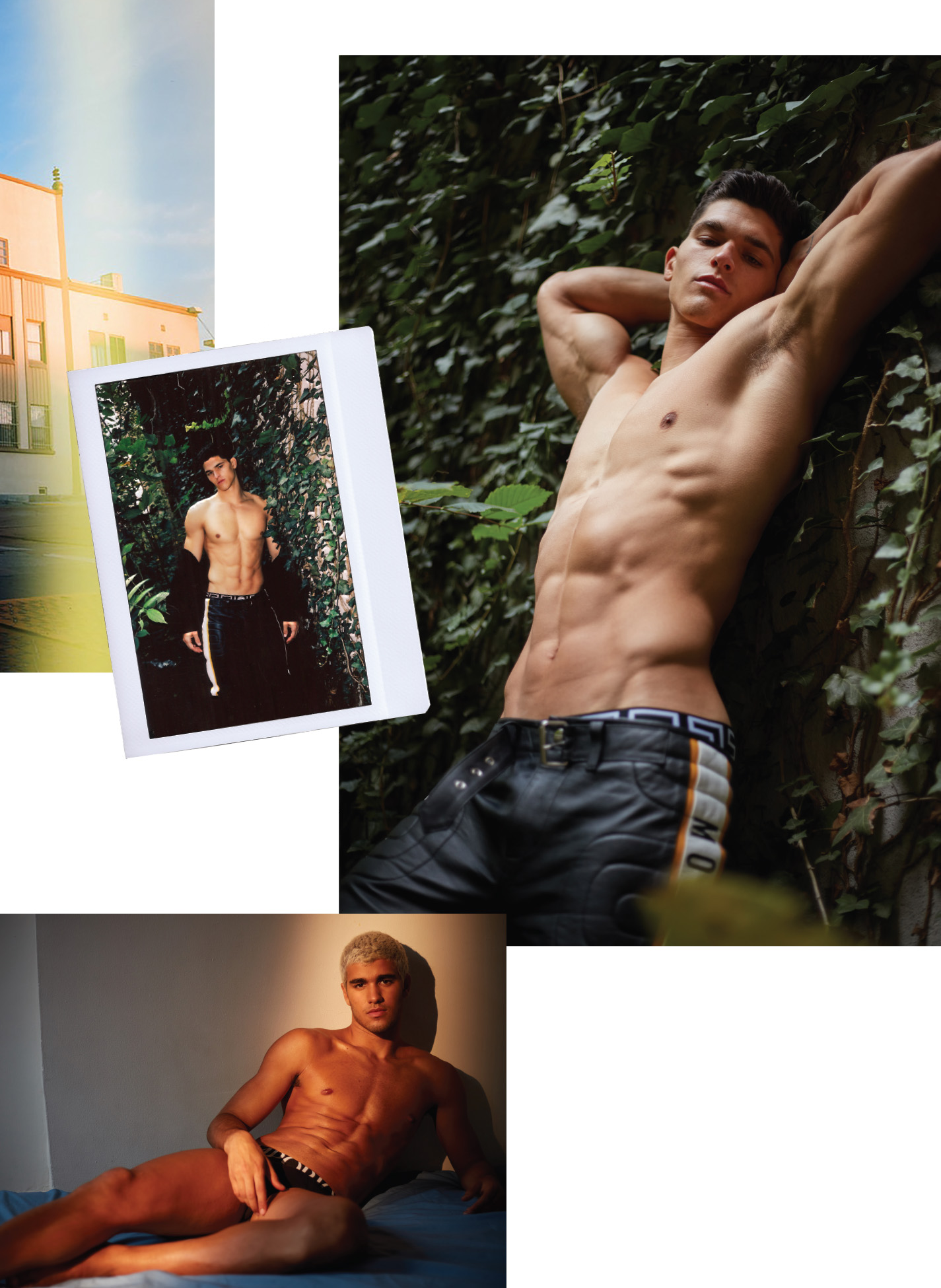
Top: On Trevor–Jacket by Versus Versace, Underwear by Versace, Trousers by Moschino.
Bottom: On Pietro– Underwear by Emporio Armani
Photography by Greg Swales | Styling by Marc Sifuentes | Models.Trevor Signorino @ Next New York, Pietro Baltazar @ Next New York,
Thom Gwin @ Soul Artist Management, Augusta Alexander @ Soul Artist Management, Tomas Skoloudik @ Heroes Models
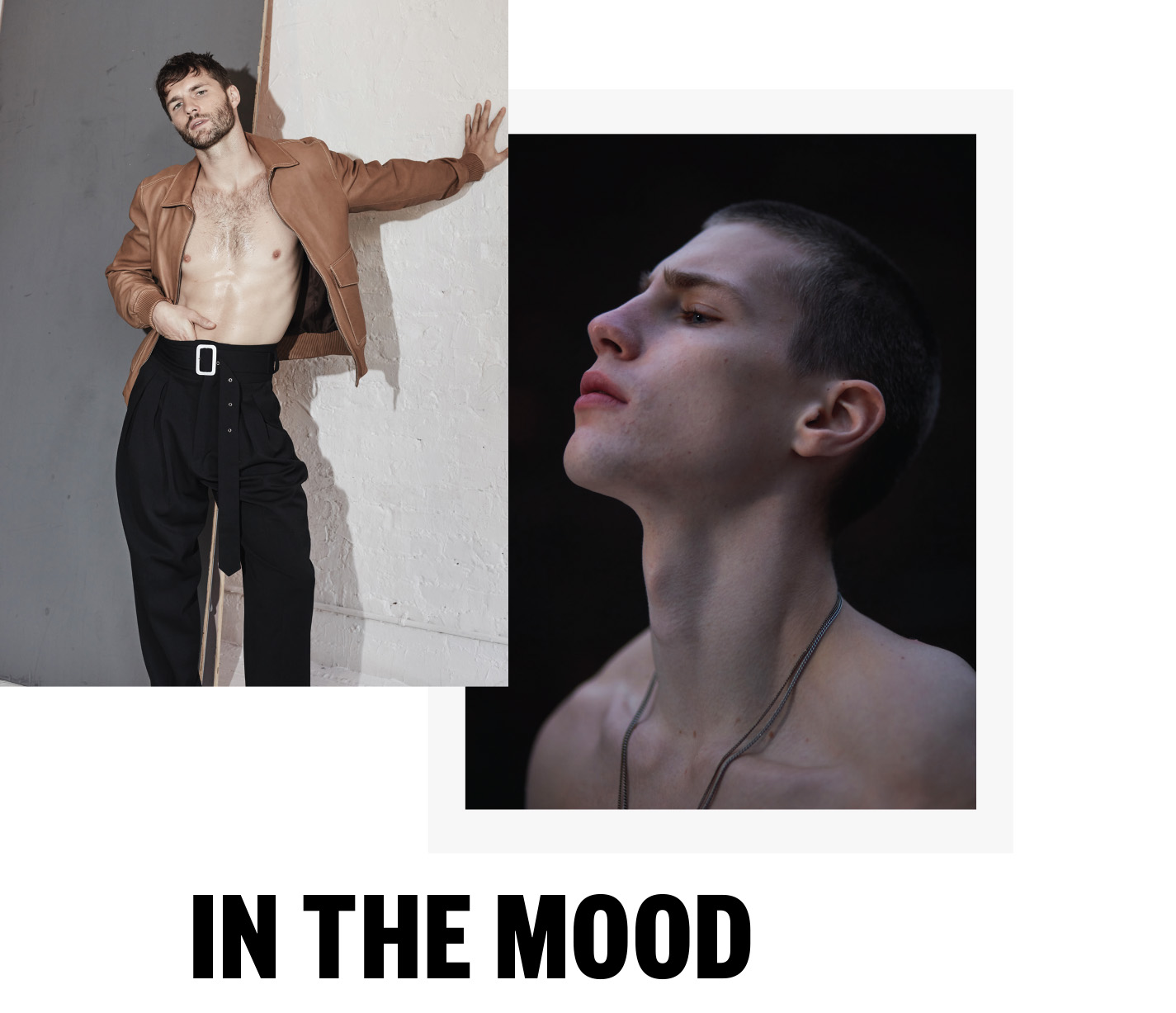
Left: On Thomas– Jacket by Michael Kors and Trousers by Kenzo
Right: On Augusta– Necklaces by Coach 1941
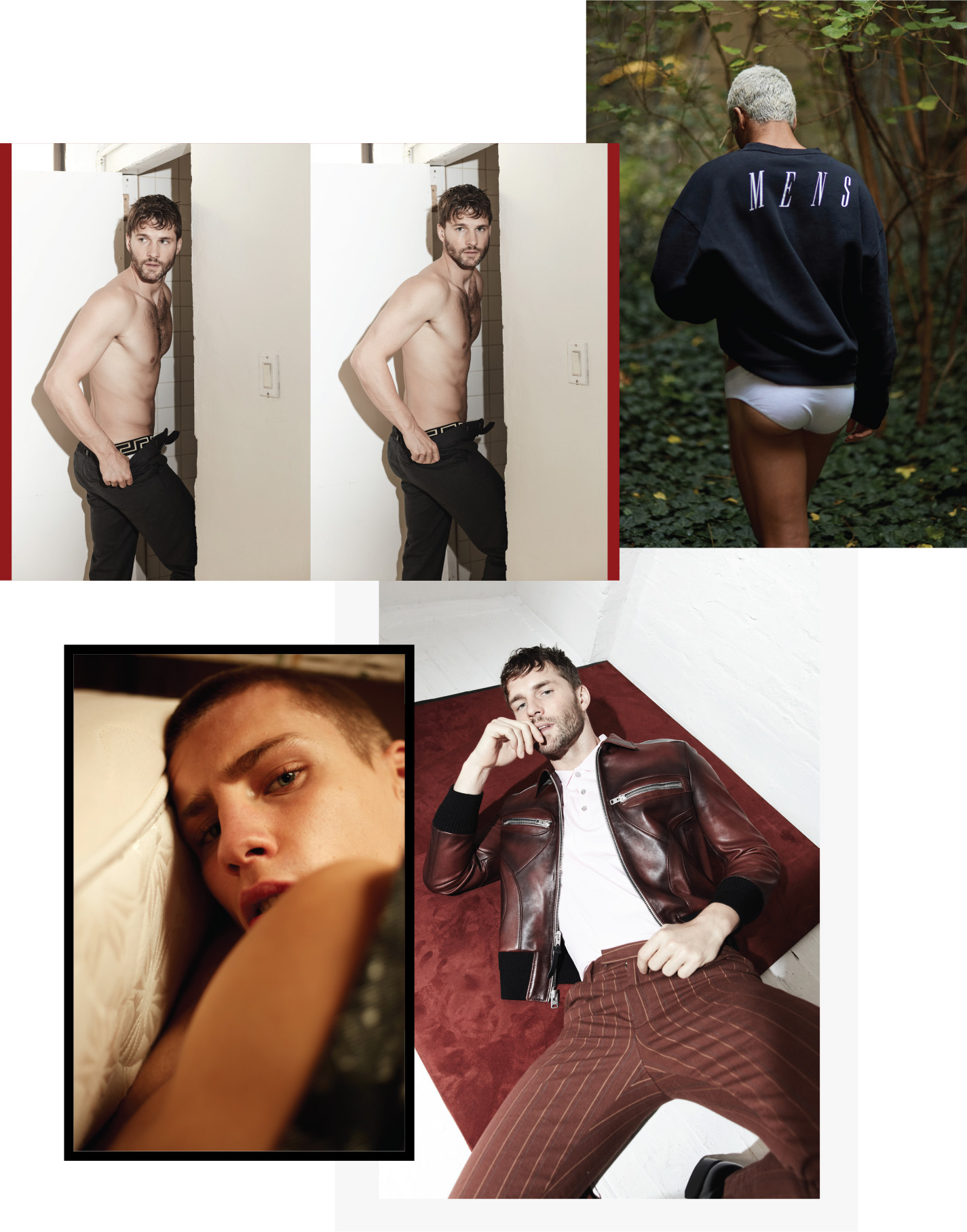
Top Left: On Tomas– Trousers by Philipp Plein, Underwear by Versace.
Top Right: On Pietro– Sweater by Off-White, Underwear by Calvin Klein.
Bottom Left: On Augusta–Shirt by Vivienne Westwood.
Bottom Right: On Tomas–Jacket and Trousers by Coach 1941, Polo Shirt by Calvin Klein
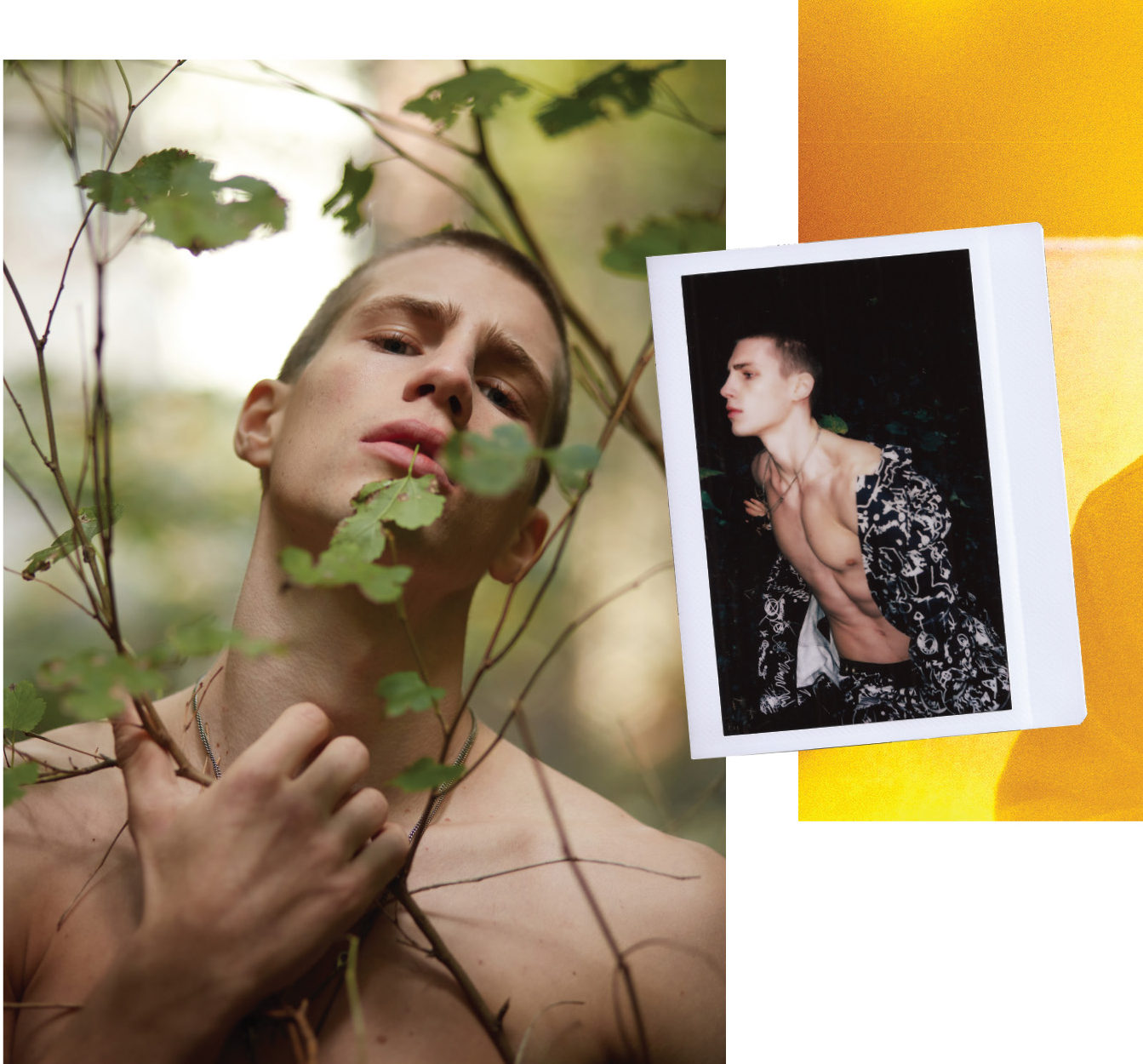
On Augusta– Shirt and Trousers by Versus Versace
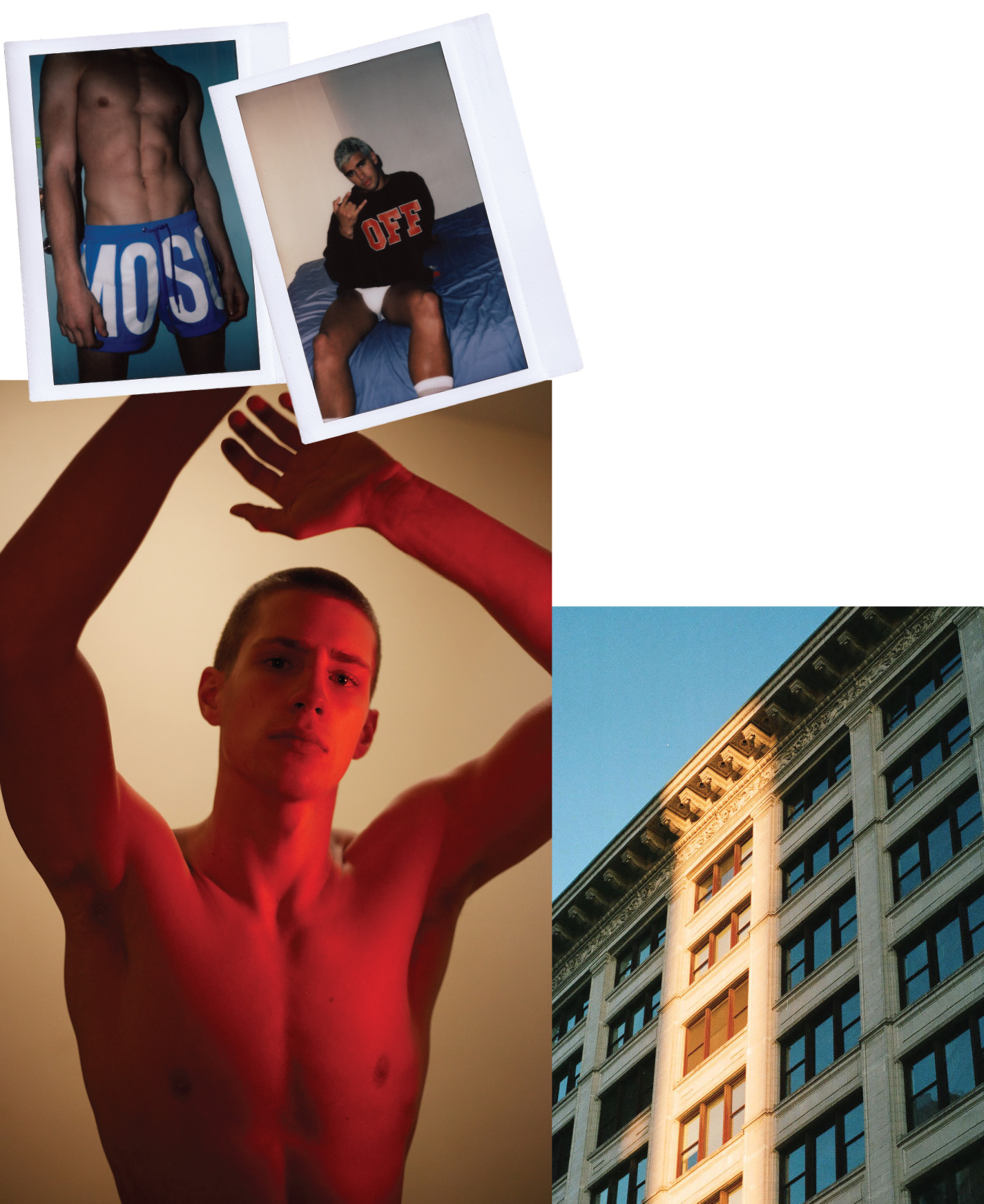
Top Left: On Augusta–Shorts by Moschino.
Top Right: On Pietro–Sweater by Off-White, Underwear by Calvin Klein.
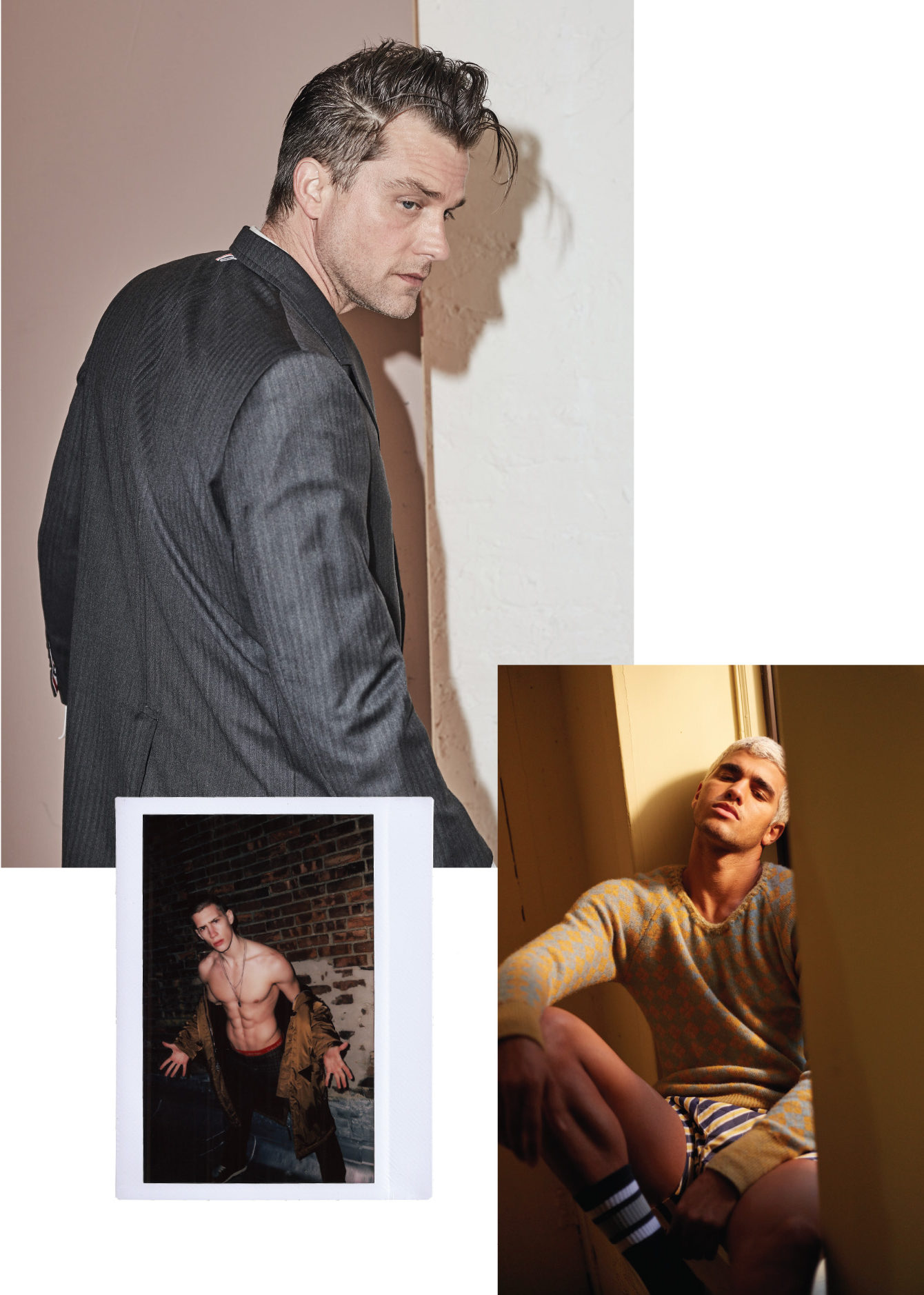
Top: On Thom– Jacket and Shirt by Thom Browne.
Bottom Left: On Augusta–Jacket, Necklaces, Trousers and Shoes by Coach 1941, Underwear by Calvin Klein.
Bottom Right: On Pietro– Sweater by Vivienne Westwood, Shorts by Kenzo and Socks by Stance
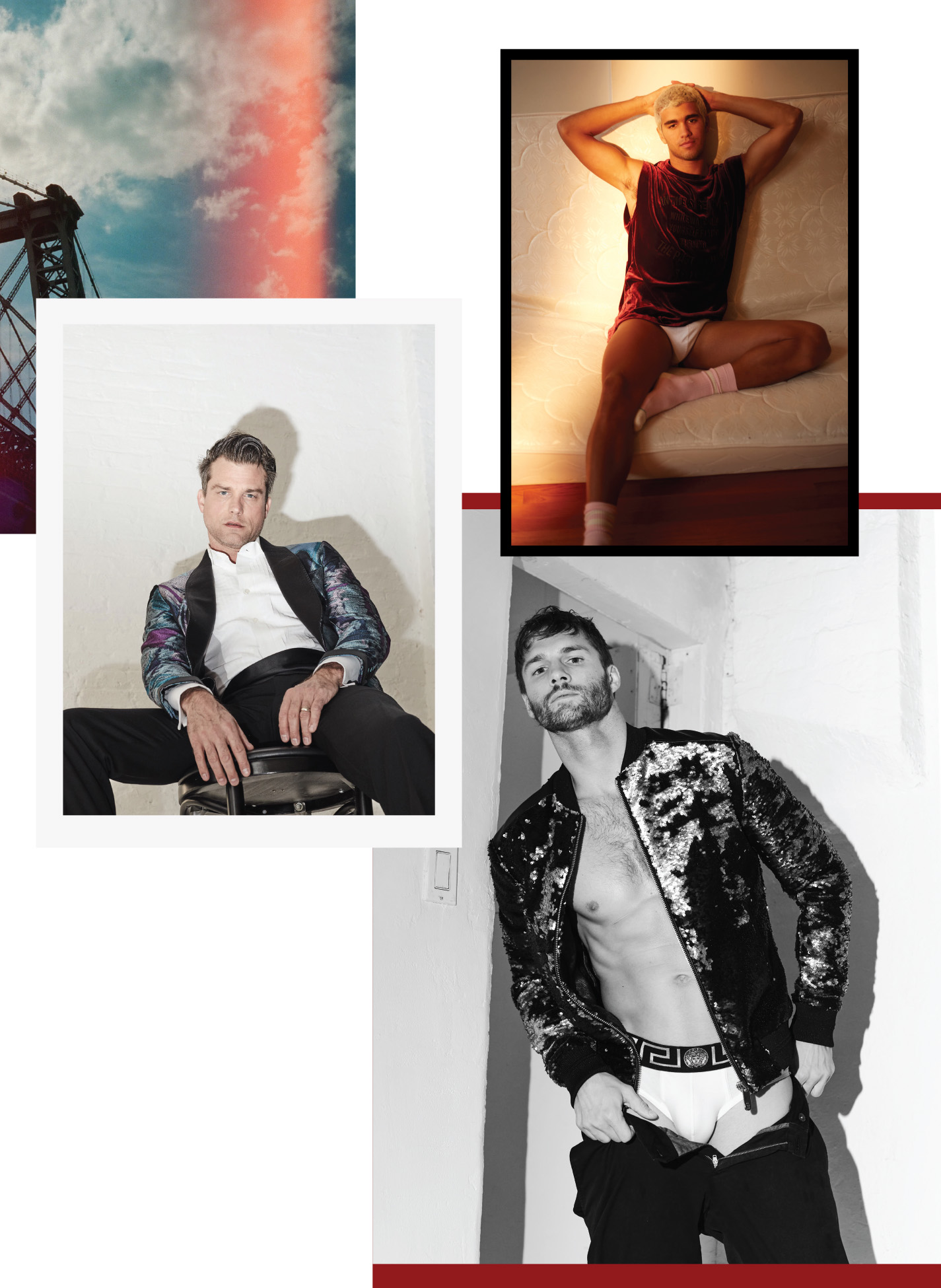
On Tom–Jacket, Shirt, Cumberbun and Trousers by Tom Ford.
Top Right: On Pietro–Tank Top by McQ, Underwear by Calvin Klein, Socks by Stance.
Bottom: On Thomas– Jacket and Trousers by Philipp Plein, Underwear by Versace.
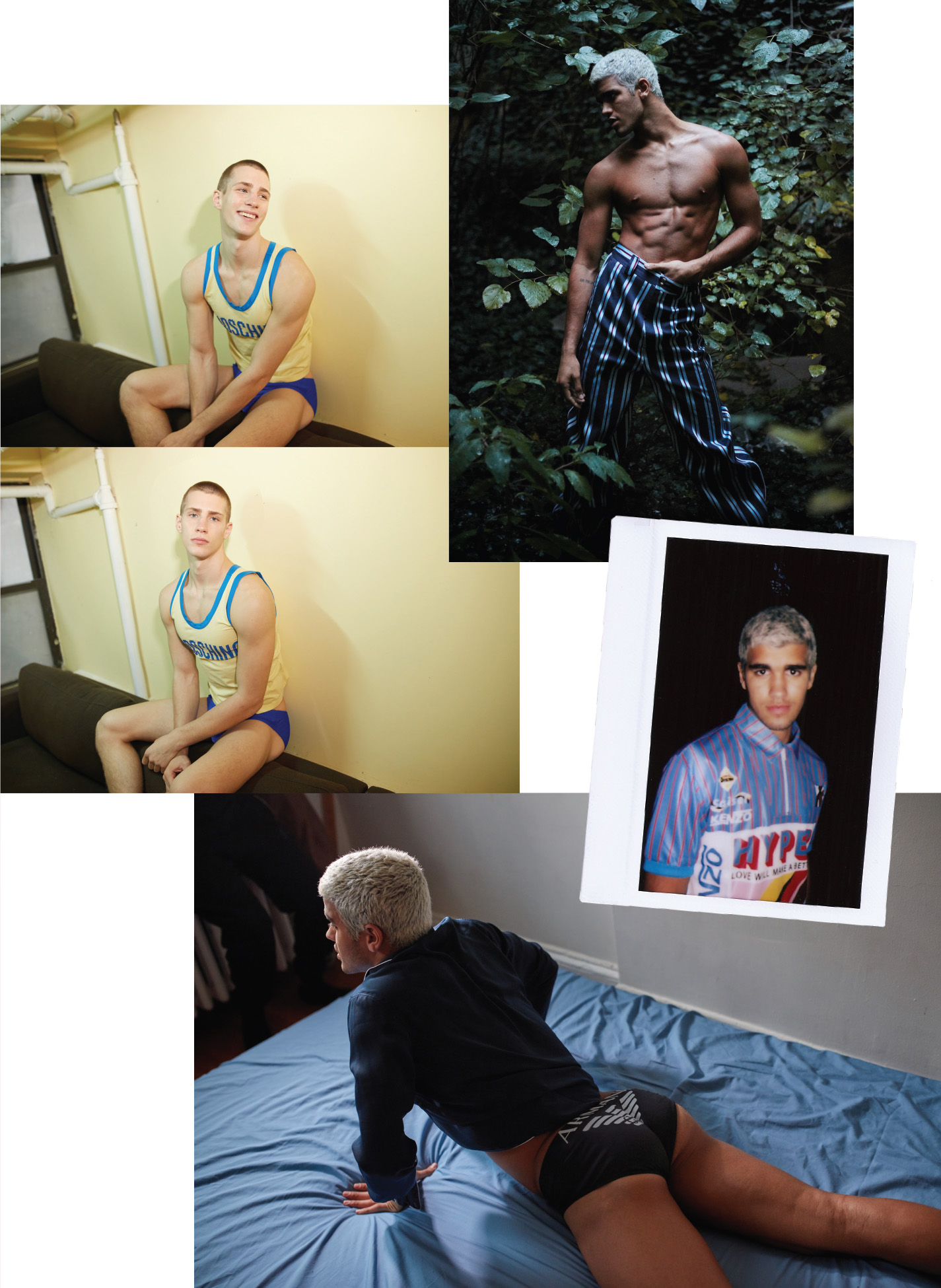
Top Left: On Augusta–Tank Top and Speedo by Moschino.
Top Right: On Pietro–Trousers and Shirt by Kenzo.
Bottom: On Pietro– Shirt by COS, Underwear by Emporio Armani.
–
Groomers: Austin Burns using Oribe (Augusta and Trevor), Gianluca Mandelli using Kerastase (Thom and Tomas), and Wendi Miyake (Pietro) Art Direction by Louis Liu, Editor-in- Chief Marc Sifuentes, Production by Benjamin Price, Stylist Assistant Justin Dahlgren, Production/ Photo Assistant Lavoisier Clemente.
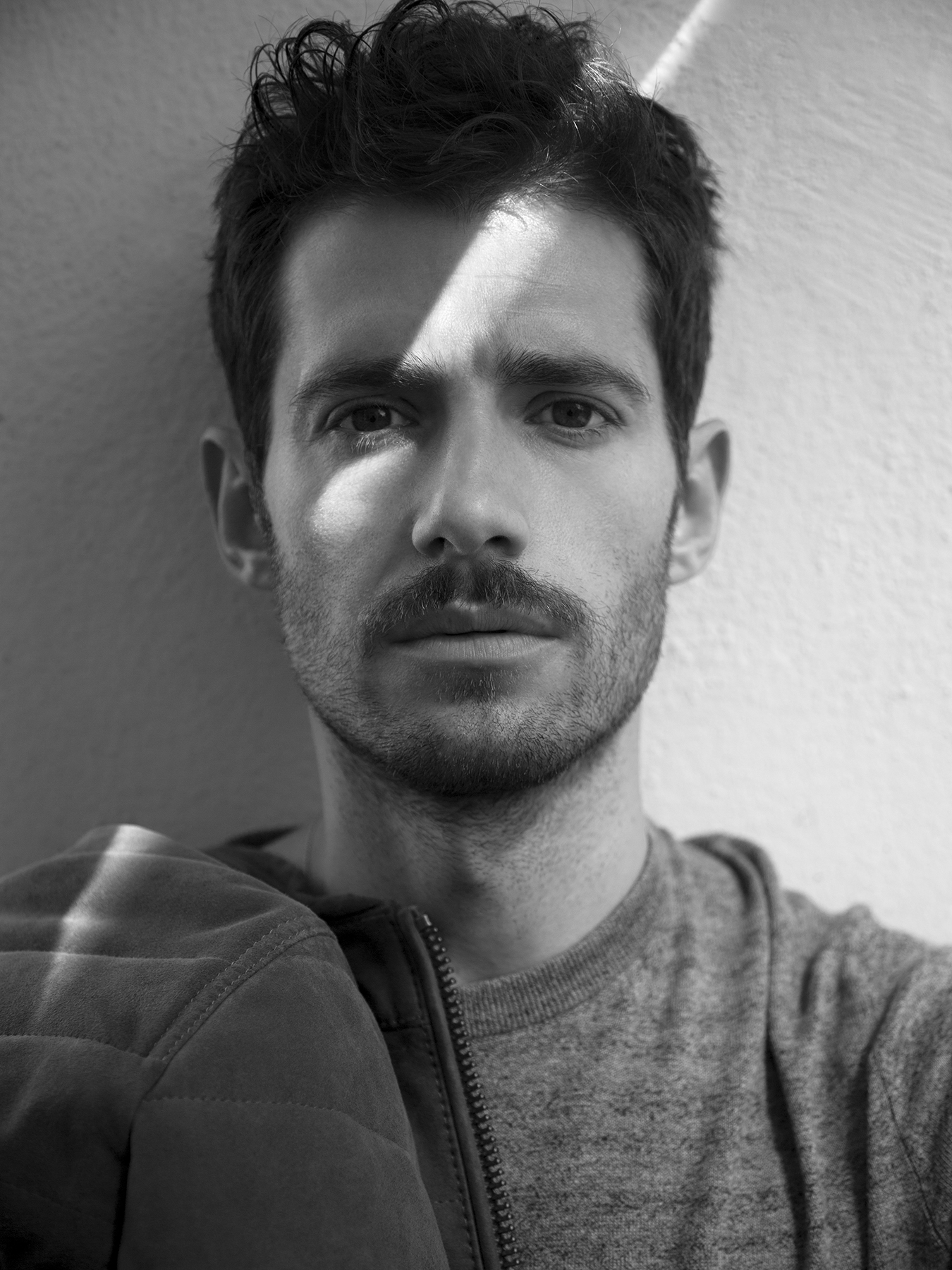
Photographed by Karl Simone | Styled by Alvin Stillwell @ Celestine Agency | Interviewed by Matthew Rettenmund
Michael Kors jacket and shirt
After three seasons with the Royal Shakespeare Company, he built a following with magnetic turns in horror fare like Cry Wolf (2005), Donkey Punch (2008) and cult-fave Sorority Row (2009). Though originally from England, he honed a foolproof American accent studying his Valkyrie (2007) co-star Tom Cruise.
Hot off a role on New Girl (2014-2015) and a return to the ABC Family teen drama Pretty Little Liars as Dr. Wren Kingston this year, just in time for that series’ sign-off, he appears to be making a clean break with less challenging roles, stunning in this summer’s British miniseries Man in an Orange Shirt as a gay man navigating empty hookup culture who discovers his grandfather was himself closeted — and had far more serious roadblocks to maneuver in the ‘40s.
Continuing his pattern of upward mobility, he is currently playing Watergate lid-blower Bob Woodward in Mark Felt: The Man Who Brought Down the White House, and will next be seen in a new film adaptation of Little Women.
His good looks have made him an easy casting decision, whether in genre flicks or on PLL, but he has always given layered performances that rise about what’s on the printed page, which may be why he’s managed to work with Carrie Fisher, Vanessa Redgrave, Liam Neeson and Dame Angela Lansbury. Unsurprisingly, in his Iris Covet Book interview, he was similarly complex, speaking comfortably about politics, the abuse scandals sweeping Hollywood, and his sex-symbol status.
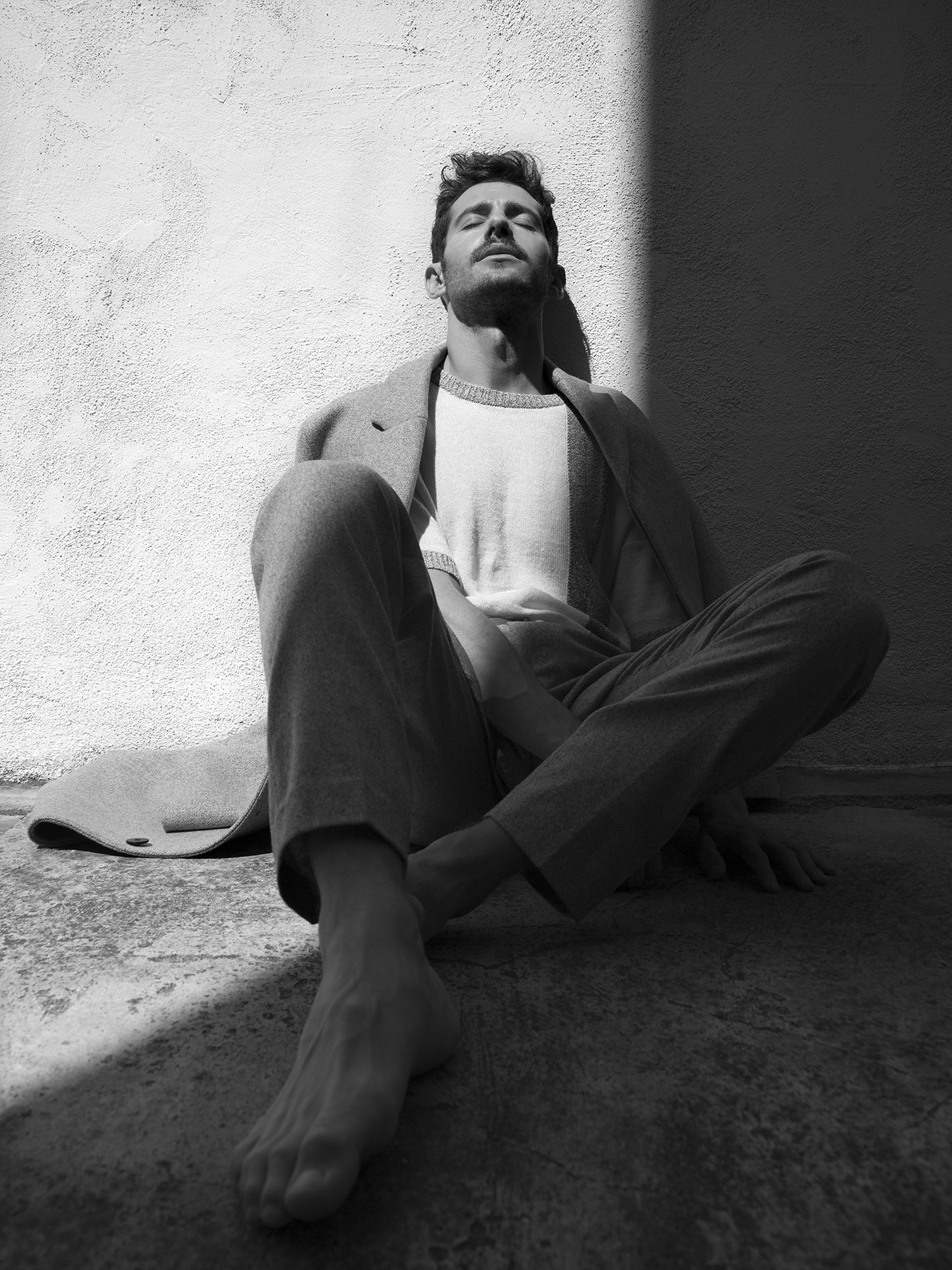
COS trench coat and trousers, Jacob Holston shirt
You started with some very intense training at the Royal Shakespeare Company. How did that stage training compare to your Hollywood experience?
Never at any point did it feel intense — it was just fun! I think what I learned in that time was that it’s about teamwork and the importance of the company and that it takes many, many people to build a production. When I got to America, I starting doing film and TV, and film work is very different, but in terms of what you do as an actor, the approach is the same. I’m lucky that as a teenager it was fun — and it still is.
You soon had a following for doing suspense and horror films like Sorority Row and Donkey Punch — are you naturally attracted to darker roles like that?
It’s not the genre. As long as the character has many layers and is interesting and challenging, that’s what I’m drawn to. I really dig horror. Some movies I’ve seen the last couple of years — The Witch (2015) and Under the Shadow (2016) — I love how they utilized horror to tell a bigger story. I’m in talks right now with a director named Kieran Evans, who I worked on Kelly + Victor with, to do a psychological horror.
There was a lot of psychological horror of a different type going on in Pretty Little Liars! Did being a part of PLL expose you to a whole new level of fandom?
Yeah, that happened. It was a really fun job. It wasn’t the most challenging work, but I had a really enjoyable time doing it from the get-go. I met one of my best friends on it, Ian Harding, and the girls and I always got along great. I remember at the time when I got the role I was supposed to go on this big trip to Africa and it was like, “Am I going to delay this trip or play this role in this pilot that may or may not go?” I wasn’t fully committed to the pilot and looked into who was making it, and it was Alloy Entertainment, who’d done tons of really successful shows, and Marlene King, whose work I really enjoyed. My gut told me that it would go, it would be special, and do well, and it did.
I never signed an option agreement with the show, despite one being offered, because I loved the people and I believed in the project, but I definitely always had an eye toward wanting to do more challenging material. The first few months of shooting that show, I was also shooting My Generation (2010-2011) in Austin, TX with Noah Hawley and Warren Littlefield. It was one of those shows where the ratings were not great. They’d be amazing now, but back then, they weren’t good enough and it was ripped off the air. Noah Hawley and Warren Littlefield went on to make Fargo (2014-present).
You left PLL and then returned this year for the final season. Was that strange leaving and coming back?
It wasn’t a strange thing; it was familiar. I continued to see and hang out with the people in the show. What was great was that in that time in-between I’d done work I was really proud of, in Hand of God (2014-2017) and New Girl and Kelly + Victor, and I’d told them I wanted to come back for the fans.
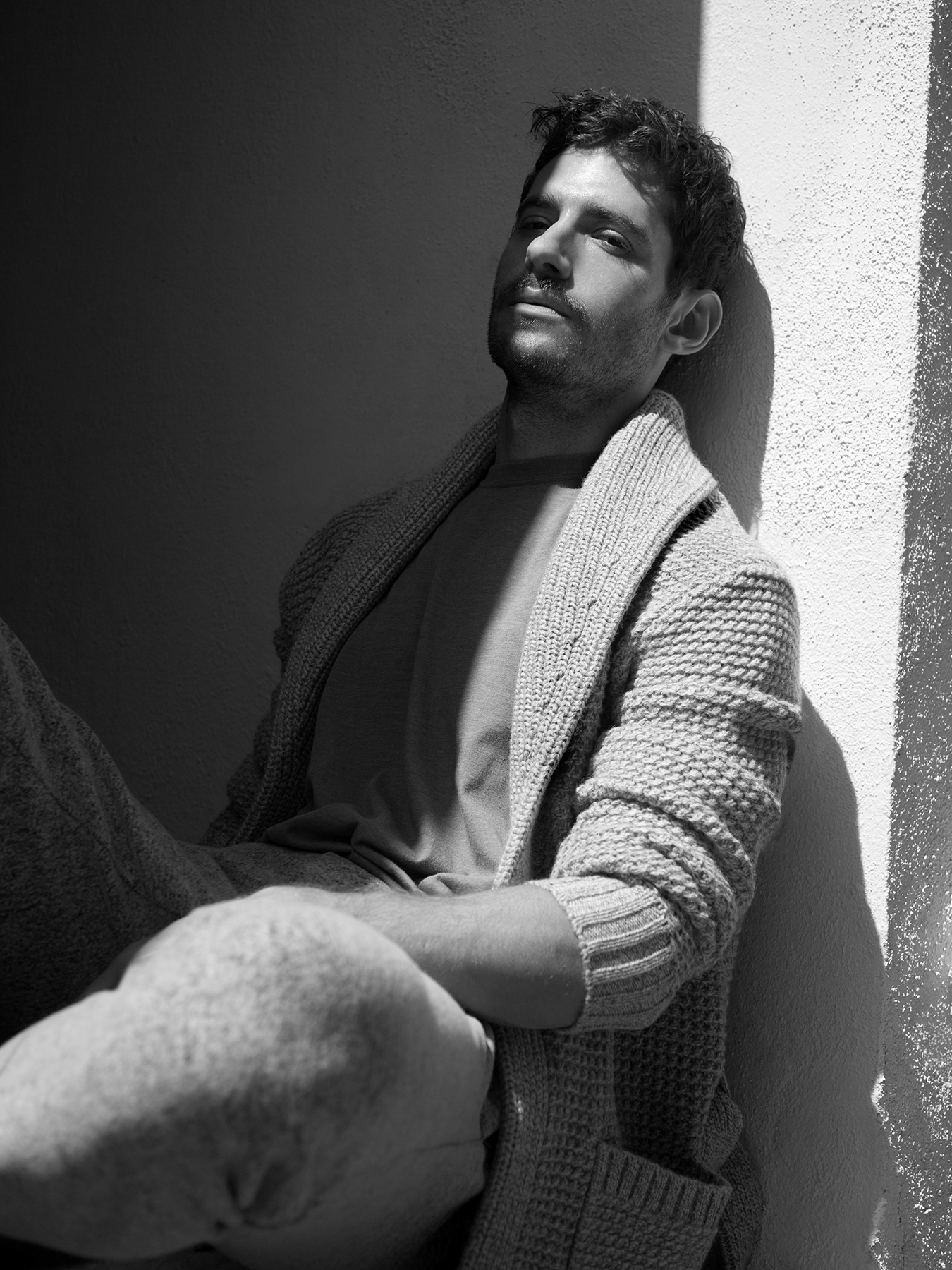
Banana Republic cardigan, Slow Build Heavy Grind shirt, Wings and Horns trouser
The great thing about that project is that once you’ve done it, you could have two Oscars in the future, but there will always be a certain sector of people who will be like, “Oh, yeah — from Pretty Little Liars!”
You and my mom say the same thing. [Laughs]
You mentioned your trip to Africa, and I saw on your Instagram that you did eventually make it to Rwanda. What was that like?
I’ve always loved animals, and I had this incredible in Borneo when I was 18 working in an orangutan sanctuary and have wanted for years and years to see the gorillas in Rwanda. It finally happened last Christmas.
It’s utterly magical. What’s so magical about it is that you see another species that is so similar to us, so like us. They’re another species, and yet you have such a sense of their humanity — you see it in their eyes, you see it in the way they interact with each other, and you see it in the way they interact with you. It’s breathtaking, and you can’t help but leave a situation like that thinking we’ve got to do everything we possibly can to help these very close relatives of ours.
Seems like an amazing observational exercise for an actor.
You’re absolutely right. One of the powers of acting, or at least what drives me to it, and why I think it’s so important or can be so important, is how universal it is — I really believe that as different as we may be superficially from each other, and it really is a superficial thing, we all experience the same emotions and dream the same and hope the same and feel devastated in exactly the same way no matter our politics or our superficial identity.
You described Hand of God as a role of a lifetime because you admired Marc Forster, who directed Monster’s Ball (2001). It’s sometimes said you shouldn’t meet your idols.
I wouldn’t say that I have “idols” in terms of my industry, I just admire them deeply. I think one of my idols was Christopher Hitchens in terms of his work in human rights, in terms of his eloquence, in terms of his integrity — and I did get to meet him. It was the only time in my life where I was completely starstruck to the extent that I couldn’t speak! He was talking to me and I just remember I had this grin on my face. I think I was speaking to him — I couldn’t tell you what I said or even what he was saying to me, I was totally starstruck.
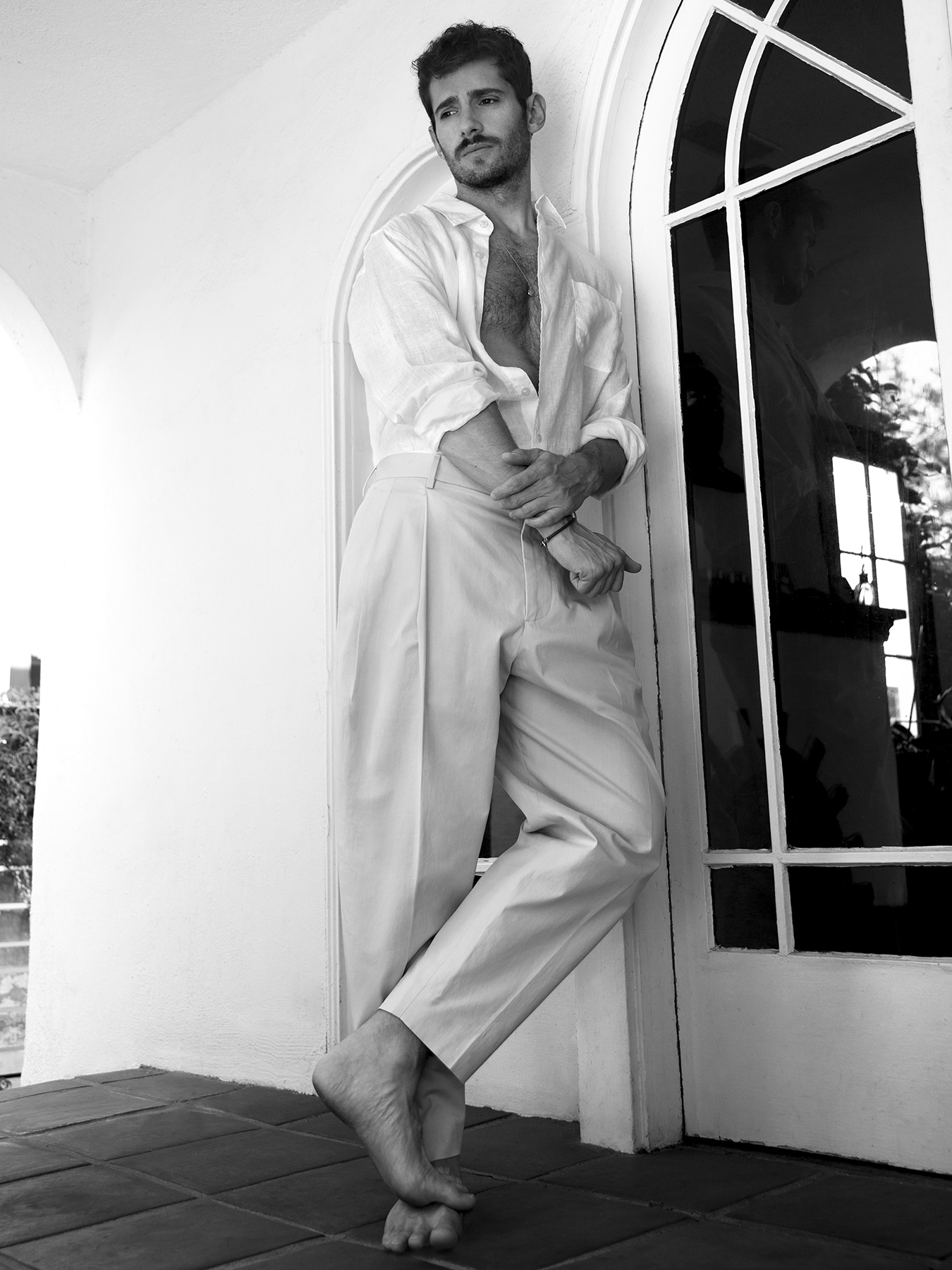
Vilebrequin shirt, COS trousers, Hermès bracelet
You’re currently playing Bob Woodward in Mark Felt: The Man Who Brought Down the White House. Why did you refer to it as “almost impossibly timed for its relevance”?
Clearly, we’re living in a time when institutions that support our democracy, that are fundamental to it, are under attack. I love what The Washington Post said: “Democracy dies in darkness.” It’s absolutely right. We need a functioning free press, and yet we have our leaders attack it daily and also of course institutions like the FBI, or our court system, our legal system, which I think is a really dangerous thing to do for politicians. I think when you use our court system to attack a political opponent or you defame an institution like the FBI when it is legitimately investigating something that is vital to our interest that it be investigated properly, that is when our institutions are under attack. In this film about Watergate, its relevancy today was very timely and striking.
What did you learn about how Woodward and Bernstein were looked upon by their fellow Americans while they were reporting these unpopular facts about Nixon. Were they similarly attacked?
I didn’t know, embarrassingly, nearly enough about Watergate going into it. It is incredible how similar it is to today, although they are very different. I think the level of attack today is really concerning and it’s coming from so many different places, not just the White House, that it makes our time, I think, so much more dangerous. Whereas back then, you had political parties that I think stood for something, today… I think they’re so… I don’t want to get too into politics, but I think at least back then you had really good people who could withstand an attack on democracy in many different places, and I think that today, it seems that we’re really wanting for good people in our legislature, and that’s concerning.
In terms of the role, it was fascinating to me to see how someone as young as Woodward was at the time of his investigation could take on someone so much more powerful than him in Mark Felt, and sort of manipulate him as any good journalist does to acquire information that would eventually bring down a government. That was an incredible discovery to look into Bob Woodward’s history to see how he might have been changed by fame.
Did Bob Woodward do a courageous thing? I think he was doing his job and was driven by his personal destiny, and that’s how I wanted to play him.
It was really an incredible time in my life making that project.
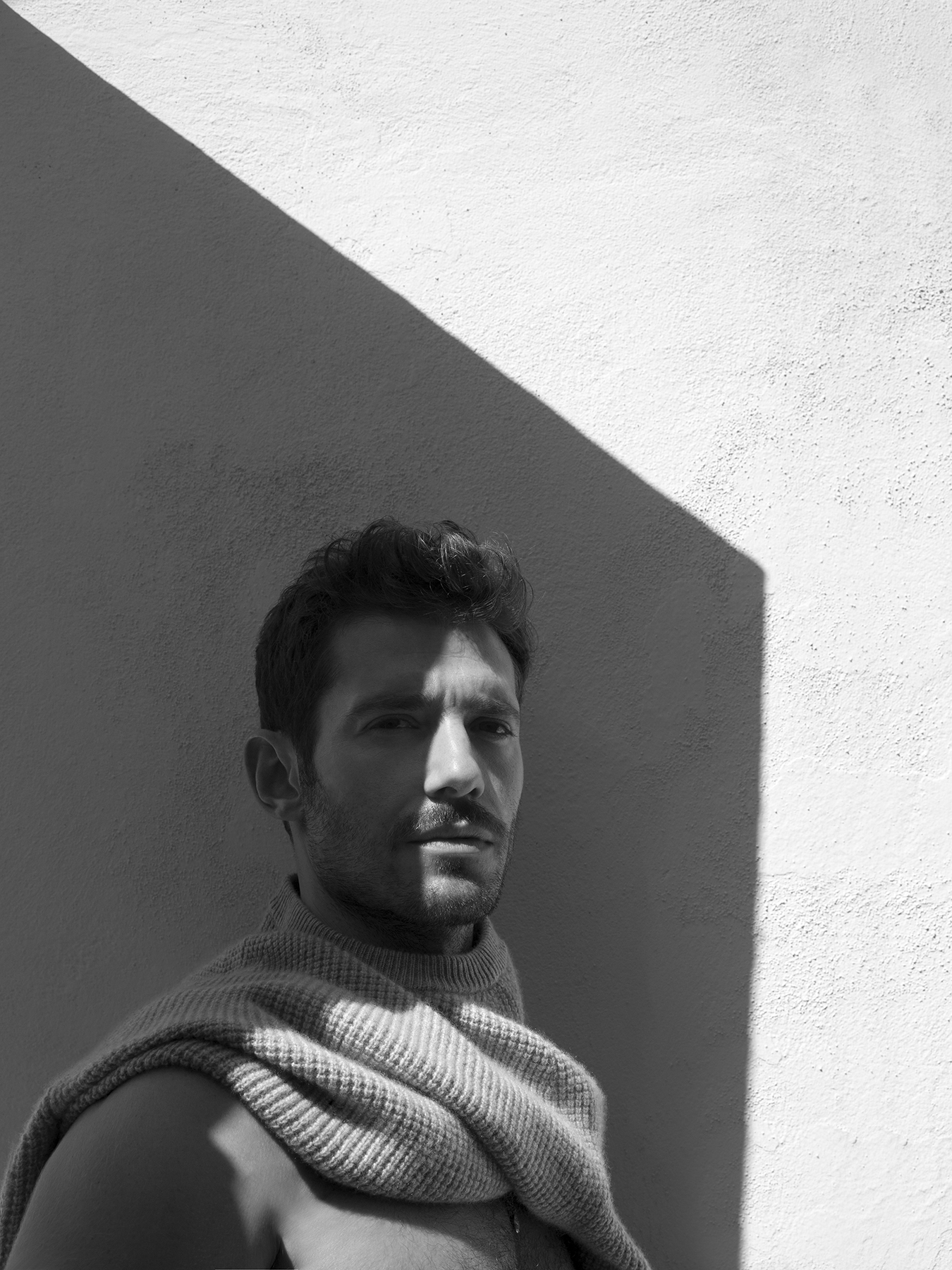
Ralph Lauren sweater
Your miniseries that aired in the UK in August, Man in an Orange Shirt, is another look back at a very different time. You play a gay man struggling with relationships who discovers his grandfather was gay and closeted in the ‘40s. Aside from working with the legendary Vanessa Redgrave, who I’m going to come back to, what did you find most compelling about the project?
There’s a number of things. I guess the first thing was the story. I think it showed something that I think is really important in society that should be revealed, and I think that any great film or artwork has that imperative to do so. It was this character that I found so moving and painful to read on the page and thinking how I might play him and thinking, “I have to play him,” and then of course the joy of working with Redgrave. But it really was a story that I felt was really important to tell.
It’s incredible to think that things were so different not so long ago.
It’s incredible how things have really changed and also how they haven’t. What was really interesting to me was to see how — it’s a multigenerational story— in the first episode it looks at what it was like to be a gay man in the ‘40s, where society deemed that an impossibility and a criminal offense. You have a man who falls in love and is denied that love by society, and then compared to my character, which takes place today in our time, where you’re able to get married and have a job and be yourself, at least in most places, although certainly not everywhere, and yet the shame that my character has carried with him all his life forced upon him by the relationship he has with his own grandmother, played by Vanessa Redgrave, makes him his own jailer. He is the one who, because of his shame, the shame that has been put upon him, his repression, denies himself love. I can’t think of anything more important in life and more sacred than that — to be loved and to allow yourself to be loved.
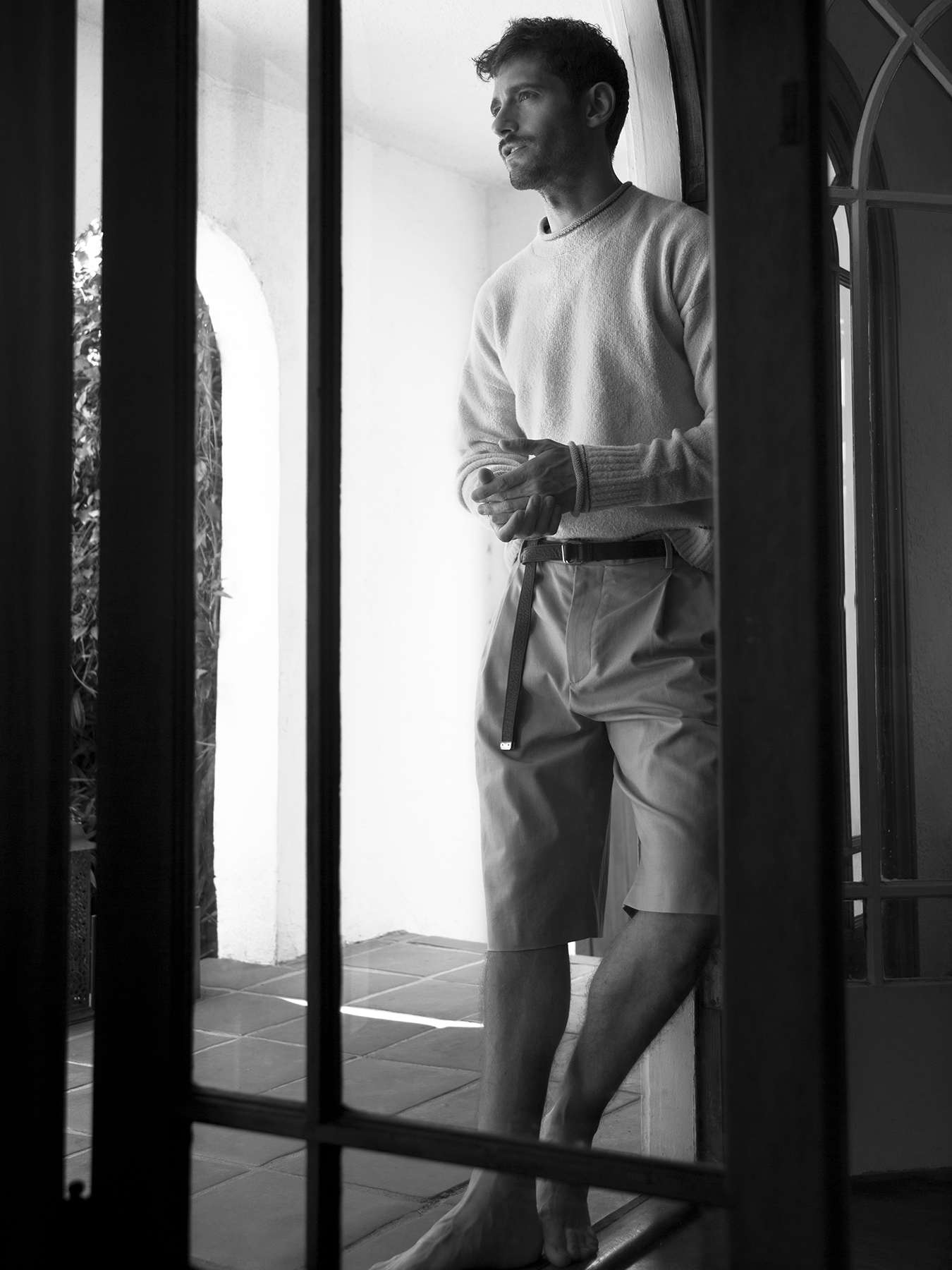
3.1 Phillip Lim sweater, COS shorts, Michael Kors belt
My impression is that Man in an Orange Shirt is very much about intimacy. What do you think about social media? Is it a doubled-edged sword because while in some ways we’re able to be much more connected much more easily, we question whether it’s a true connection?
One thing about social media and the internet is that it does connect. It connects people together and people who certainly might not feel a ready connection in their small environments. So, if you’re in a small town and put-upon, you can reach out and find someone who’s like you and there’s a strength in that. You can reach out and find people who are similar to you and then find people who are not like you and that connection is wonderful, too.
The challenge, though, is that it’s such a new technology and the change is happening so rapidly that its challenges are here and yet we’re taking too long to adapt to them. Before, when change came about, we had time to adapt to it, and yet now clearly we’re finding that hard to do. You see how the promise of social media to be this great connector, to be great for democracy, for freedom of speech, was in fact not so great in the last election or in Europe and is no doubt being utilized as a tool of propaganda by the enemies of free speech and liberalism and democracy… and we didn’t even know it! It was happening and yet we allowed it to happen because we didn’t know it was happening. Now, the conversation is about how we adapt to it. How do we prevent the manipulation of a tool of such potentially good things to be used against us?
I’m really against identity politics. I don’t like the atomization of it where we’re just individuals living alongside each other without any connection. I think that type of atomization leads to the populism that we’ve been seeing, certainly in Europe, and is the source of the dysfunction in society that I think we have.
Speaking of change, you’re in an industry going through turmoil due to sex-abuse allegations. Is it an exciting time? A scary time?
I have two feelings about what’s happening right now, and of course it’s not just happening in our industry, it’s happening across the board. I’m devastated reading the stories of these women and men who have been preyed upon. But also, there seems to be a cultural shift that hopefully will prevent these sorts of acts from happening again. I think if you look at any shift in terms of a progression of society, whether it’s civil rights or gay rights, the liberalization of society, it’s a cultural one and it’s a really positive one. So I think if we can come out of this time with a change, determined to really help people feel open enough to tell their story, we can hopefully stop people from preying on the vulnerable.
Chris Evans has talked about a provocative shoot he did for Flaunt, saying his publicist was against it because it showed too much skin. You show a lot of your body in Man in an Orange Shirt, and also did a revealing shoot a few years ago that was every gay man’s screensaver for a while — what’s your approach to nudity, whether on film or for a photo shoot?
I’m not fazed by nudity. I don’t have a hang-up about being naked. In terms of work, it has to serve the story and the director’s vision or it becomes gratuitous.
Back to Vanessa Redgrave.
Genuinely, she is amazing to work with. I love and adore her. We got really close making Man in an Orange Shirt, in part because the material was so intimate, and all her scenes were with me, long days, just the two of us. I really admire her, I admire her of course for her talent, her intelligence, her silliness. She’s so silly on set in a fun, dramatic, and really funny way. I adore her. I loved being with her. As an actress, she is formidable. She is fierce. She is highly intelligent. She picks apart the script like only a truly great and truly intelligent actor can. You’ll do takes and she’ll be good — she’s always good — and then suddenly it will connect and something amazing will happen! And I’m like, “Fuck! How do I match that? How do I bring my game up to her level?” You’re pushing yourself and she’s pushing you and it’s wonderful. The other great thing is — and this isn’t true of every big actor that I’ve worked with — she is always there for you. She is giving her all. She is always there for you.
Leaving Pretty Little Liars, the dream was to work with people like this and be challenged. This is the dream.
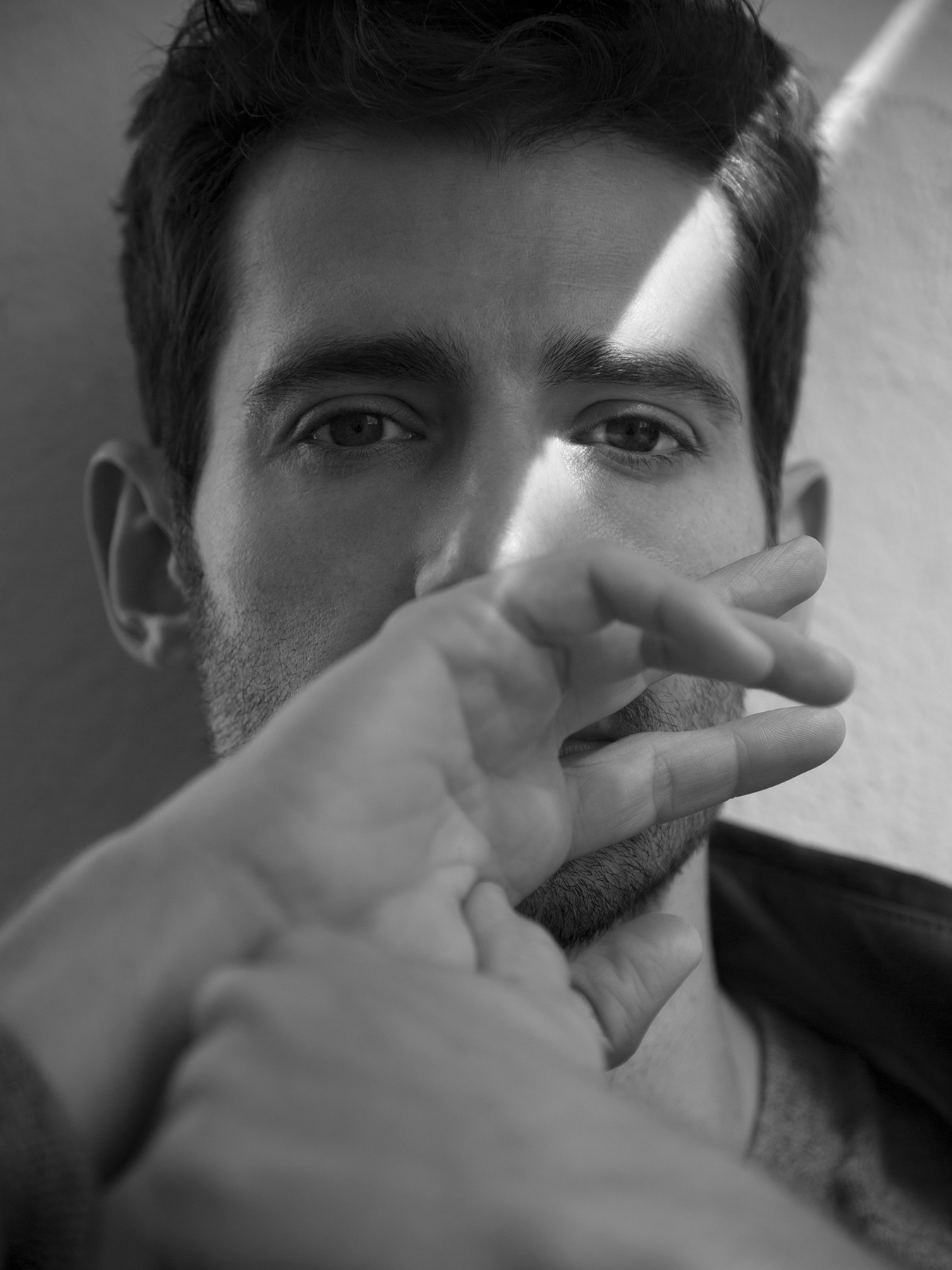
Michael Kors jacket and shirt
Grooming by Mira Chai Hyde at The Wall Group using Caudal Skincare Profound Beauty Hair
Special thanks to Simon Shwartz
Cheyenne Jackson is a master of his own destiny. From sleepy Spokane, Washington, to the lights of Broadway, and now in the luxe hills of Hollywood, Jackson has scaled the ladder of success to become a leading man on stage and in film.
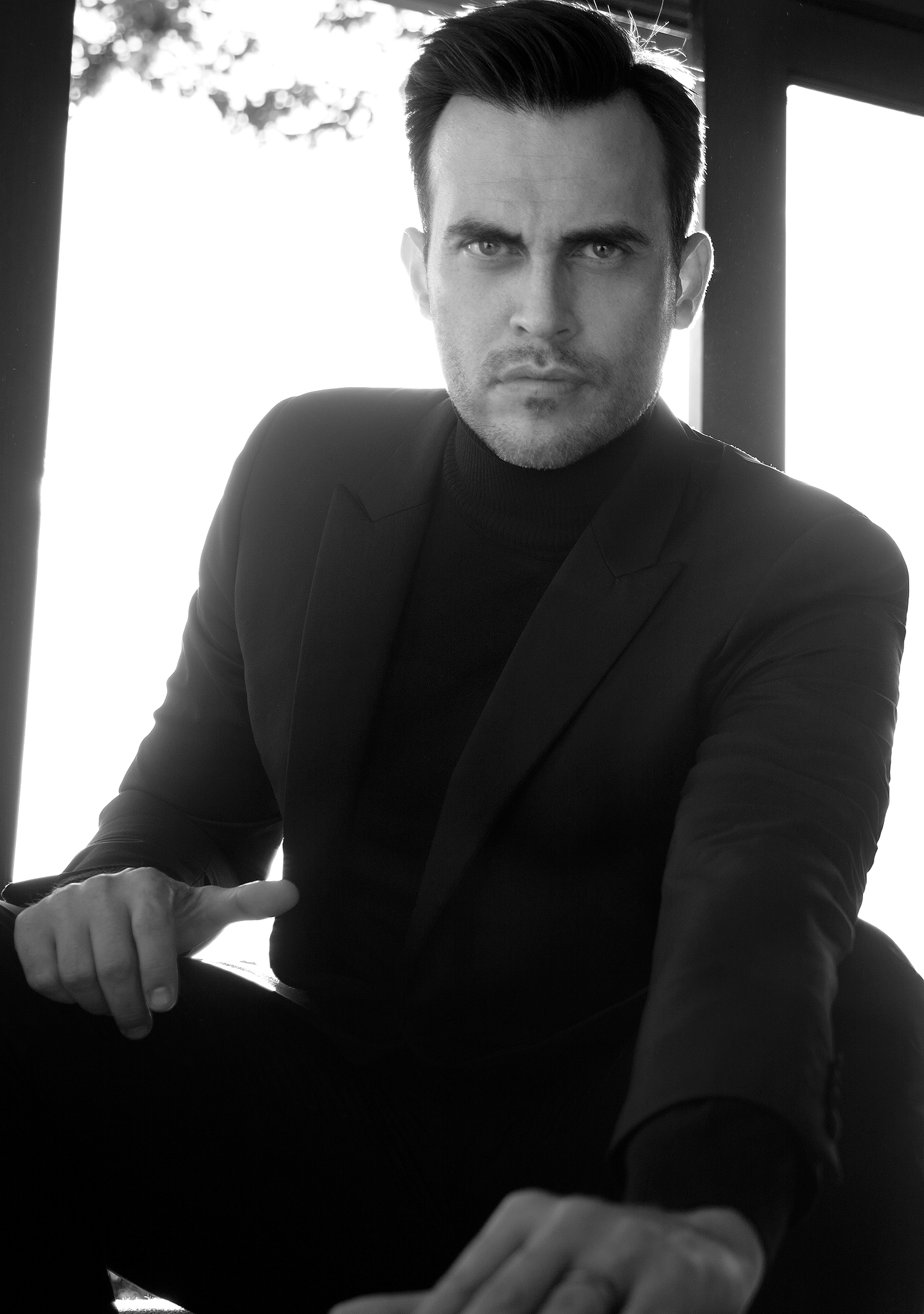
Photography by Karl Simone | Grooming by Lacy Boughton | Interview by Benjamin Price
Sweater by Gucci and Coat by Firetrap
Cheyenne Jackson is a Grammy-nominated singer, actor, and songwriter who, as a musician, dancer, artist, writer, husband and father of twins, is the definition of a “Renaissance Man”. Cheyenne has starred in a litany of noteworthy television shows, theatre productions, and films including the American Horror Story series, the critically acclaimed The Most Happy Fella in New York City, and David West Read’s play The Performers opposite Henry Winkler, Ari Graynor, and Alicia Silverstone. His performance in Steven Soderbergh’s award-winning Behind The Candelabra, with Michael Douglas and Matt Damon, was multi-layered and added a new dimension to his on-screen acting reel. Whether it is singing and dancing onstage, or marrying Lady Gaga in a demonic hotel in American Horror Story: Hotel, Mr. Jackson brings new life to each character he plays.
Cheyenne will soon be on our television screens once again as one of Ryan Murphy’s elaborately crafted characters on American Horror Story: Cult, a new comedy series entitled American Woman, and he continues to work on his own writing, music, and an upcoming project in animated voiceovers.
In addition to all his artistic accolades, Jackson is fully immersed in several charities focusing on a variety of social issues. Cheyenne is a strong advocate for LGBT rights, marriage equality, animal welfare, and HIV/AIDS research. He is an international ambassador for The Foundation for AIDS Research (amfAR) and serves as the national ambassador and spokesperson for The Hetrick-Martin Institute and the Harvey Milk High School. Jackson also actively supports “The Trevor Project” and the Gay Lesbian and Straight Education Network. Cheyenne Jackson sat down with IRIS Covet Book to discuss his journey as a small town boy on Broadway, our current political discourse, and dressing up as Wonder Woman.
How did your professional path as an actor take you from regional theatre in Seattle to the Broadway stage?
I had never had the guts to make the move to NYC up until 9/11 happened… and I didn’t want to waste any more time in my life. I was 27 years old at the time, which is considered late to be “starting”, I knew it was now or never. I decided to head to New York City because it is the home of Broadway. I was determined, I was prepared, and I was lucky. My first broadway audition was for Thoroughly Modern Millie and I booked it. I was on Broadway after six weeks of being in NYC. I was in the ensemble, was understudy to the two male leads, and it was heaven!
How did you make the jump from the theatre stage to television?
Tina Fey came and saw me in a production of DAMN YANKEES at the New York City Center when I was starring alongside Sean Hayes and Jane Krakowski, and she asked to meet me afterward. She said she liked my “big midwestern face” and my comedic timing, and I joined the cast of 30 Rock a few months later. It was the most amazing four years of comedy and television training. Baptism by friendly fire, as it were.
How young were you when you knew you wanted to be performing? Were there any signs as a child that you would be in the entertainment world?
As young as I can remember. I sang from the time I was 2 years old, and I knew music would be a big theme in my life. By the time I was 7 years old I was making my own Wonder Woman bracelets and tiaras out of cardboard, so there were signs that entertainment was in my future.
What is your favorite movie/musical and why?
It has to be Mary Poppins because it’s perfect and it reminds me of being a little kid when everything was safe and worry-free.
When your agent offers you a script or an audition, how do you decide which roles work for you?
For me, it is definitely a gut feeling that I need. If I find myself reading the material out loud rather than in my head, that’s usually a good sign. Then there is the logistics. I’m a new dad of twins so now I tend to pick things that will hopefully not take me away from them for too long. I took 6 months off to be a stay-at-home dad, and it was the best decision I’ve ever made.
You’ve had your time on the television screen, the stage, and the big screen, but is there a “dream role” that you would like to play?
I don’t think it’s been written yet. I’d love my own half hour dramedy series. Something that is topical, irreverent and funny. Like Veep on HBO.
Do you ever think of getting into the world of producing or directing?
I do sometimes. I love the whole process of film and television. I could definitely see myself pursuing something behind the camera at some point.
Speaking of behind the camera, how did you find yourself working with writer and producer Ryan Murphy on the American Horror Story series?
We met after he saw me in Xanadu on Broadway and he hired me for the second season of GLEE. We’ve worked together ever since. His mind is such a mystery to me, and I’m so thankful for him.
Can you tell us about your role in American Horror Story? What can we expect?
All I can tell you is my character’s name is Dr. Rudy Vincent and that I’m having a lot of fun this season. I’m sworn to secrecy, even in press, to give specifics, but I will say it was great fun to play a doctor. I learned a lot. It’s my third year on the show and it’s my favorite season so far.
Is there a dream actor that you would like to work with in your lifetime?
I’d love to have the opportunity to work on a project with Julia Louis-Dreyfus, Nicole Kidman, or Robert Downey Jr.
What has been one of your favorite collaborations in your career?
I have a few so far. It was great working on Behind the Candelabra with Michael Douglas, 30 Rock alongside Alec Baldwin, a pilot called The Onion News Network with Jeffrey Tambor, and an episode I had with Gwyneth Paltrow on GLEE. These are just a few of the highlights.
When not on set or rehearsing for a role, how do you like to spend your time?
With my kids and my husband in a big dog pile in our TV room. I love traveling and I love to be outside. My mom lives in Laguna so we spend time with her.
Last year you became a father of two, how have they changed your outlook on life? Is it what you expected?
I always knew I was going to be a father. It’s the only thing I’ve ever been certain of. When it finally happened it’s as if my life began when they were born. Cliché? Maybe. True? Absolutely. It’s just so profound. My work is still important to me but my perspective has changed…the urge to provide for my family is stronger than ever, but the insignificant stuff I used to sweat in my career means so much less now that I know what’s really important.
You met your husband during at an AA meeting you both were attending, how did you two help each other cope with addiction during this period?
We were both newly sober and definitely at turning points in our lives. We found each other when we needed each other the most. In life, we just have to help each other get through this life together. He’s a magnificent person.
What advice would you give someone struggling with alcohol addiction?
Reach out and get help. There is no shame in asking for help; in fact, asking for help and admitting you need help actually takes more bravery than anything else.
What began your involvement with amfAR and Hetrick-Martin institute? Can you tell us about that work and why these charities are close to your heart?
I became personally affected by the disease when a friend of mine was diagnosed with HIV. I felt a desire to get more involved and help in any way I could. I contacted amfAR and asked how I could help. The Hetrick-Martin Institute came to me and asked me to come tour their facility and meet with their team. I went on the tour and loved the work they were doing, and I’ve supported them ever since.
You are involved with over a dozen charities focusing on social issues which include LGBT rights, marriage equality, animal welfare, and HIV/AIDS research, why do you find it so important to give back in this way?
Because I know how lucky I am to have what I have and live where I live. Giving back gets me out of my head and helps me focus on something other than what’s going on with me. I need to be of service in order to feel good about myself; it’s as simple as that.
Given the current state of the world in politics, environmental concerns, social change, etc. what advice would you give to anyone who want to get involved in giving back to their communities?
If you want more peace of mind, more relaxation, more harmony in your head, you should do some charity work. Being of service is the best way to get out of your own way and get some much needed perspective in this crazy world.
With the rhetoric coming from the White House that trans people should not serve in the military and legislature that will allow discrimination based on sexual orientation, are you worried that the LGBTQ community is in serious jeopardy?
How could one not be when under this abhorrent man that is our president? But I have faith in our community, and what I do know is that all this has lit a fire in many people who were previously fairly politically dormant. People are more awake than ever.
As a member of the media, and of the gay community, what do you think is your responsibility to the country when Hollywood and the LGBTQ world are under fire?
The best defense is to live out louder than ever. I am an open honest person and I live it out loud. I’m a gay father and I’ve been out of the closet for 23 years. I have no secrets and I treat people the way I want to be treated, and that’s what Jason and I are teaching our children. Live through example. Be open. Be interested in others.
What is next for you and your career? More music? More film? Maybe something completely different?
American Horror Story: Cult airs September 5th. American Woman airs early next year on Paramount TV. I’d love to continue to work on great television shows and continue to tell stories. I would also love to make more music. I am going to start writing again; I have a lot more to say now. I will always be open to making movies. Currently, I am getting into voiceover work now as well. I’m shooting my first animated pilot next month and have had the opportunity to work with some of the best animated voiceover artists in the country. It turns out I have all these voices in me. Who knew?
What advice would you give to a young actor/singer who is trying to make it in Hollywood or on Broadway today?
Be open. Do your homework. Be kind. Get a thick skin. Don’t google yourself. Don’t be an asshole. Work on your mix. Get it strong and consistent. (Singers will know what I’m talking about!)
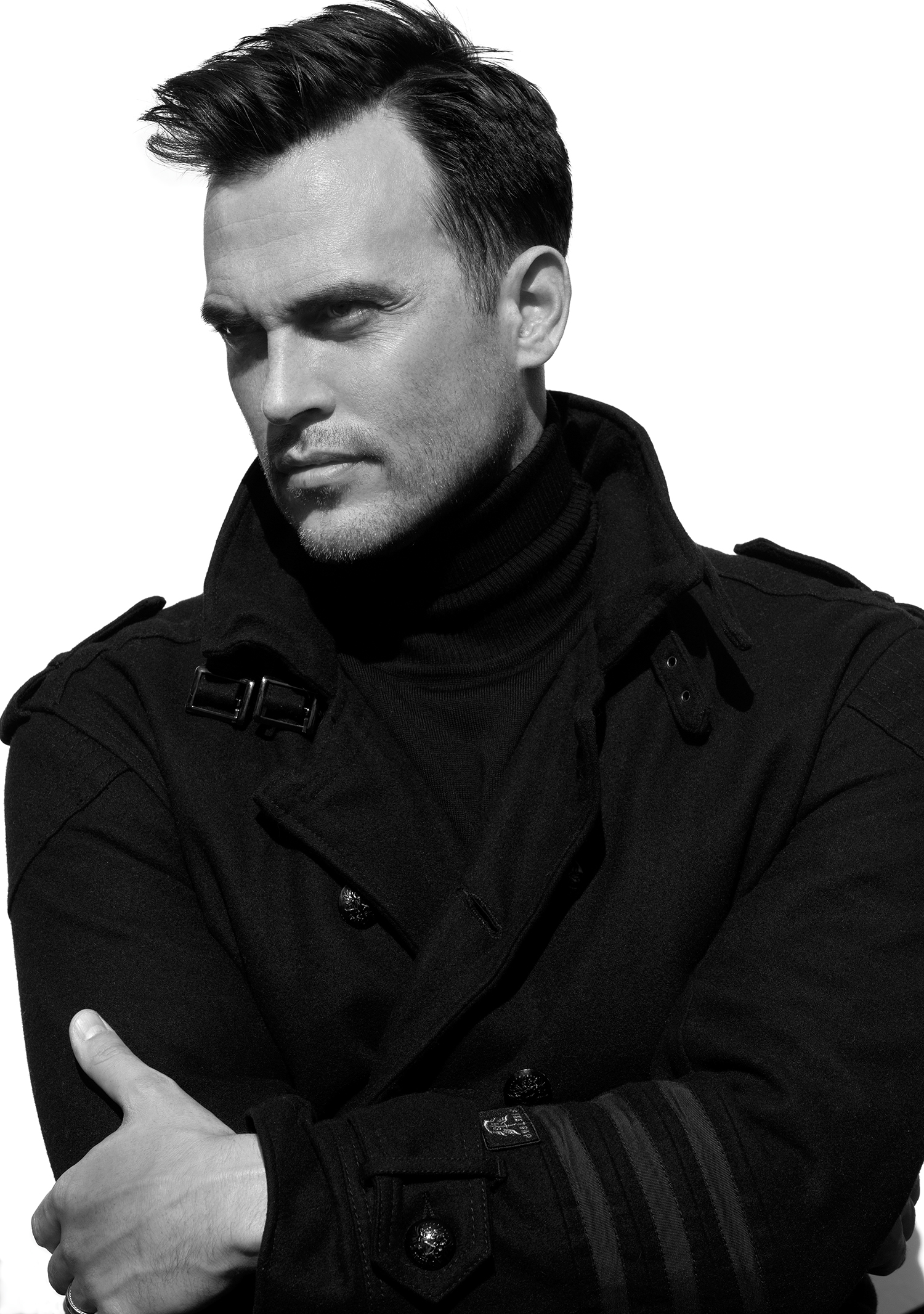
Full Look by Calvin Klein

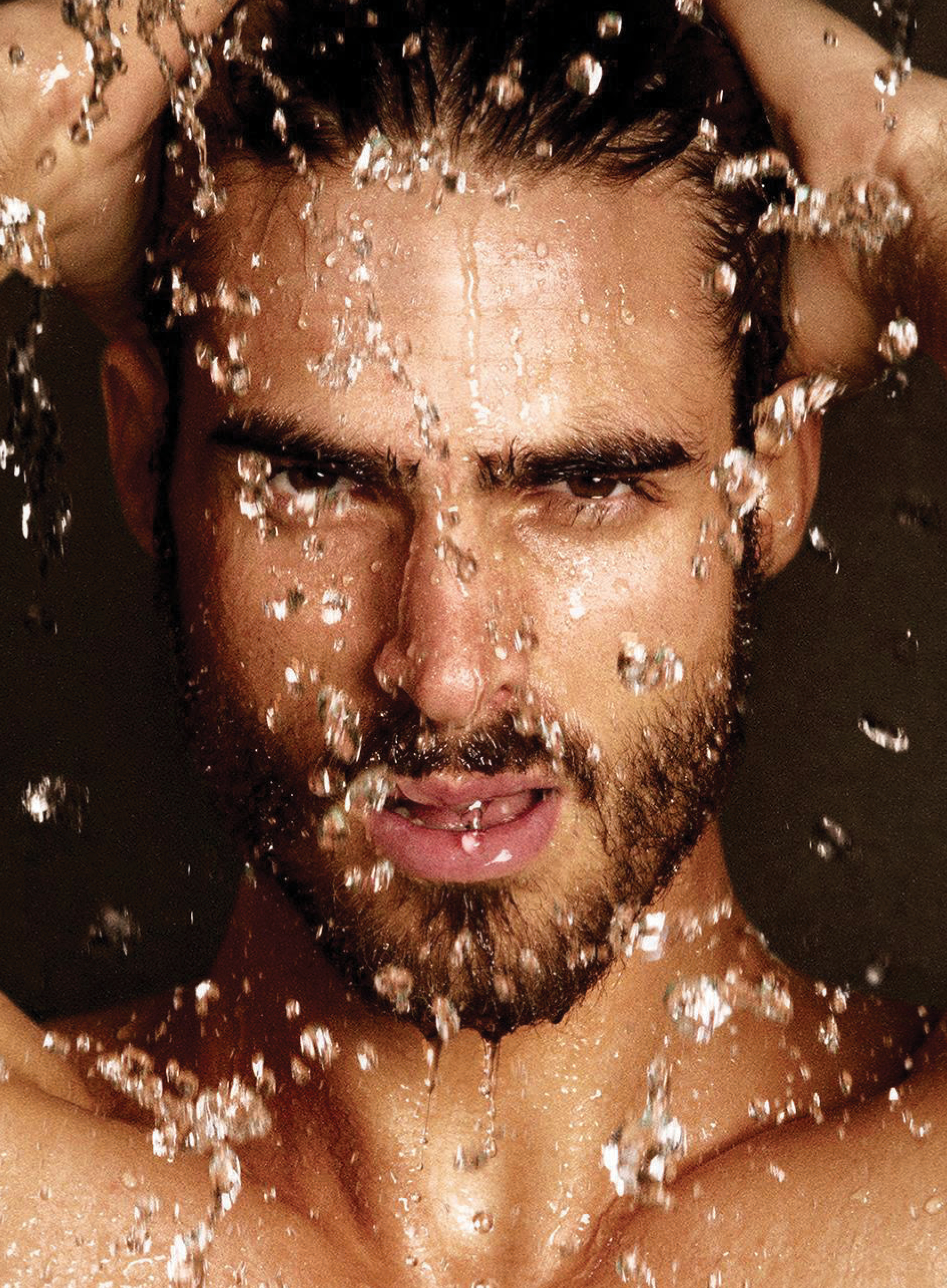
“If you’re at the Oscars there’s not a man on that red carpet who is not wearing make-up. Most straight actors I know get quite used to it. Even when they go out in real life they grab some sort of bronzer and they throw it on. They dye their eyebrows, they dye their lashes – they know the tricks. But they won’t talk about it because I think that a lot of men confuse wanting to look good as something feminine. Using a bit of cover stick to cover broken capillaries or a spot or a pimple, I’m not trying to look like a woman. There is no shame in wanting to look like the best version of you.” – Tom Ford
Neroli portofino conditioning beard oil/ 1 Oz – $50
The key to a well-kept beard is daily grooming and conditioning. This beard oil conditions, softens and nourishes the beard with a lightweight blend of almond, jojoba and grapeseed oils as well as vitamin E. Available in three iconic Tom Ford private blend scents: oud wood, neroli portofino and tobacco vanille. Follow by combing with Tom Ford beard comb to smooth hair and help disperse oil evenly.
Intensive purifying mud mask/ 3.4 Oz/100 ml – $60
A weekly clay mask treatment is integral to my personal grooming routine. I developed this time-signaling mud mask to counter the dulling and irritating effects of a busy lifestyle on the skin. As the mask turns light gray, it draws out oil, dirt and toxins and diminishes tension lines. When you rinse it off, your skin feels clean, hydrated and conditioned, and you look revitalized and younger.
Skin revitalizing concentrate/ 1.0 Oz/30 ml – $150
When your skin is depleted or dry, adding a multifunctional treatment oil into your regimen before moisturizing is one of the simplest ways to energize and regenerate it. This concentrate contains the highest concentration of the Tom Ford skin calming
and infusing complexes, plus essential oils and other enriching natural ingredients. It deeply hydrates and nourishes the skin, and it conditions it before shaving and soothes it afterwards. Your skin has fewer fine lines and greater resilience against damage.
